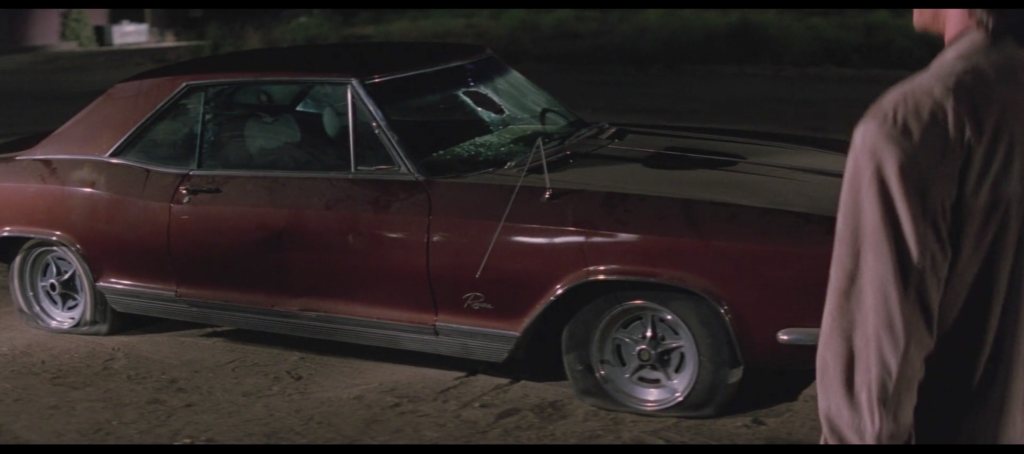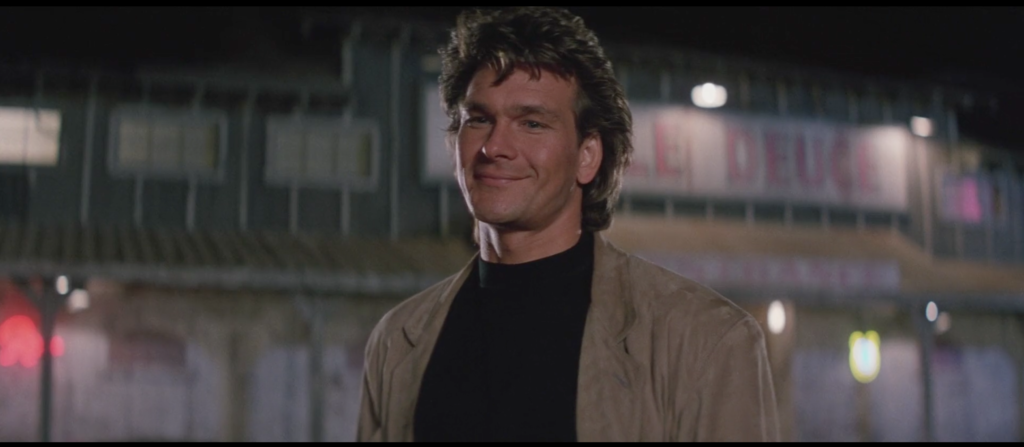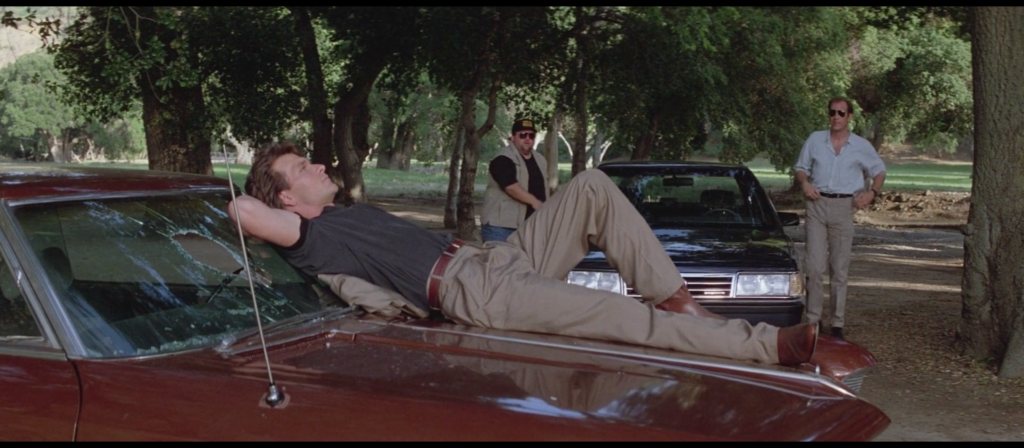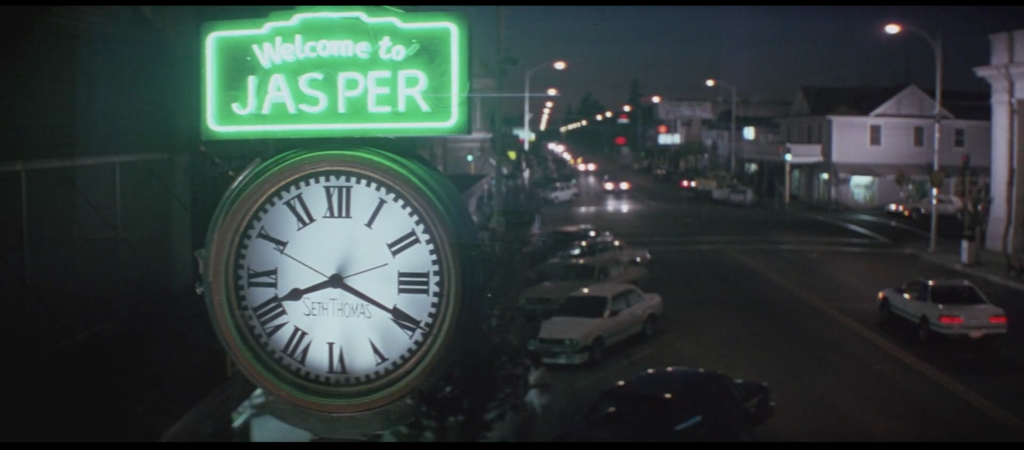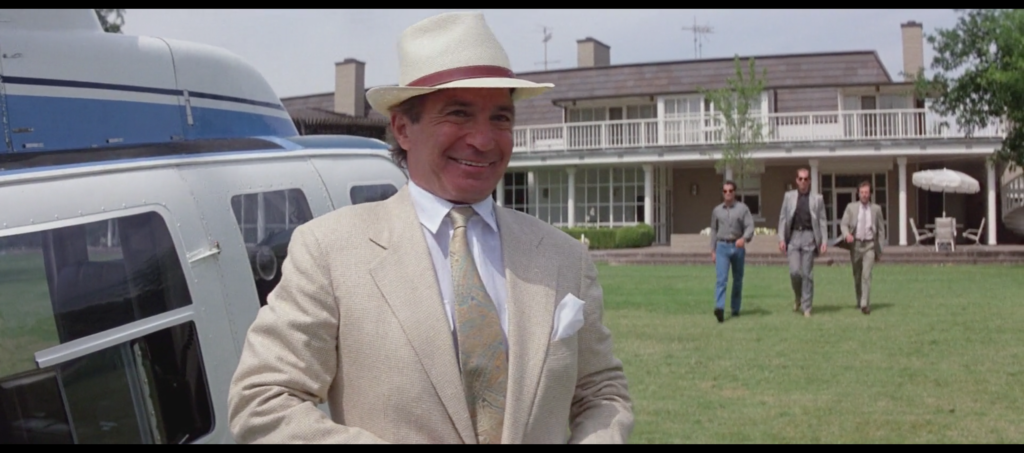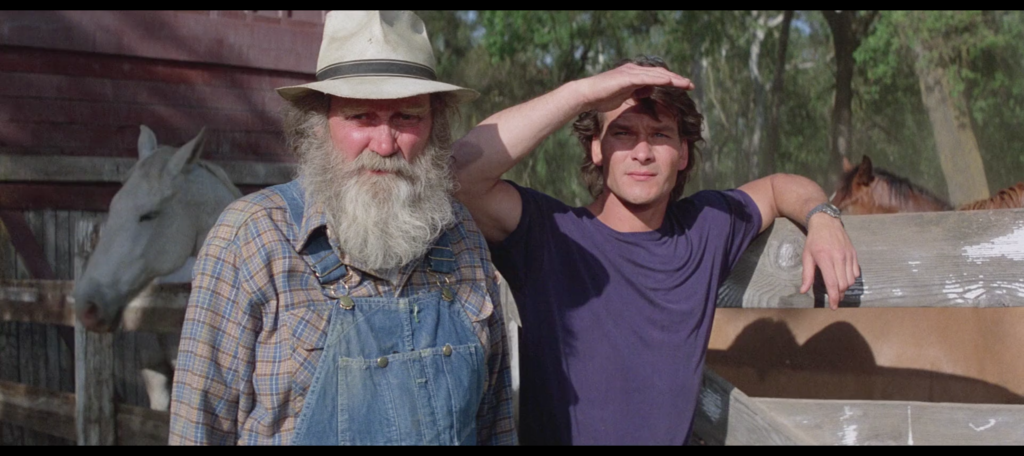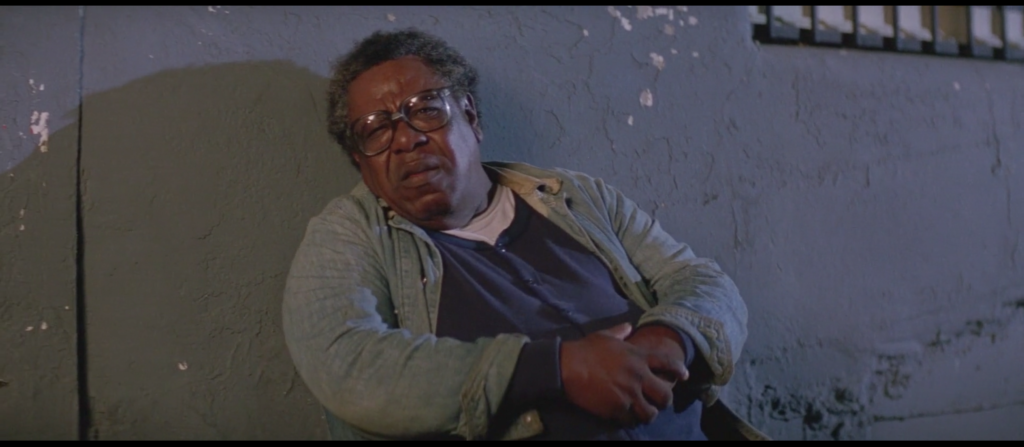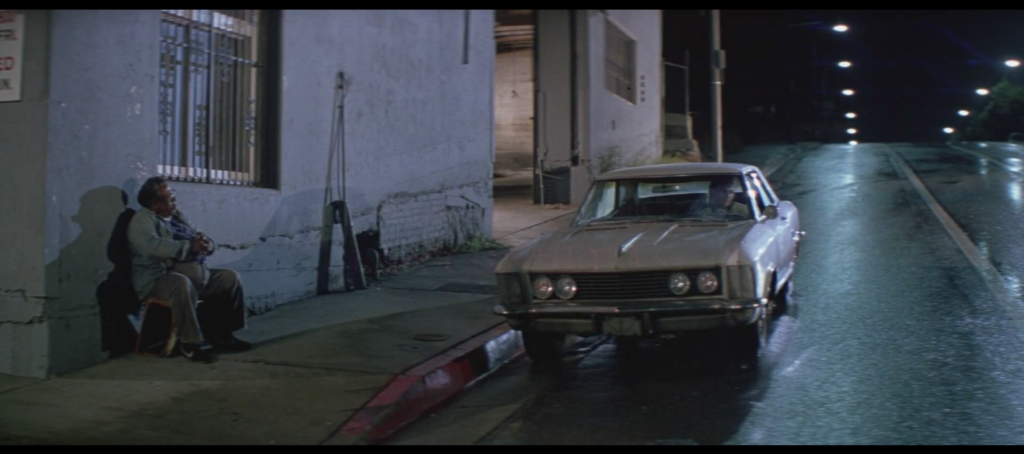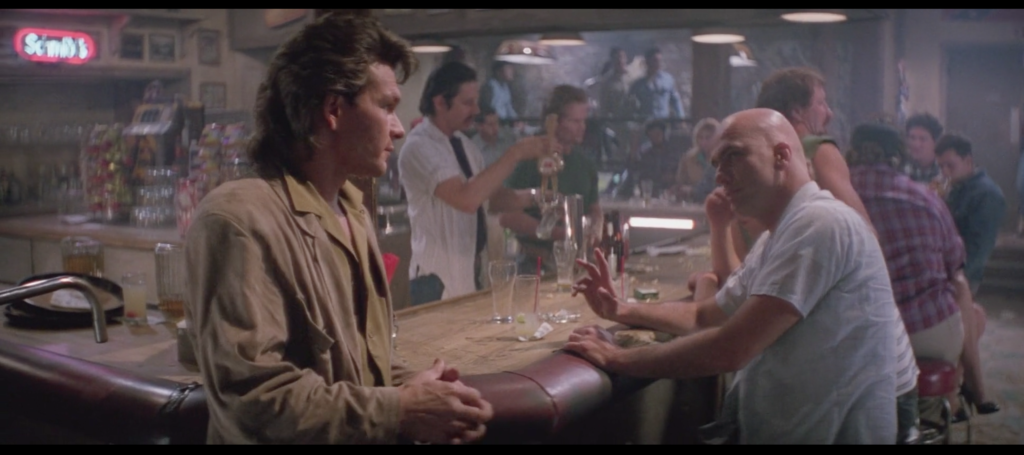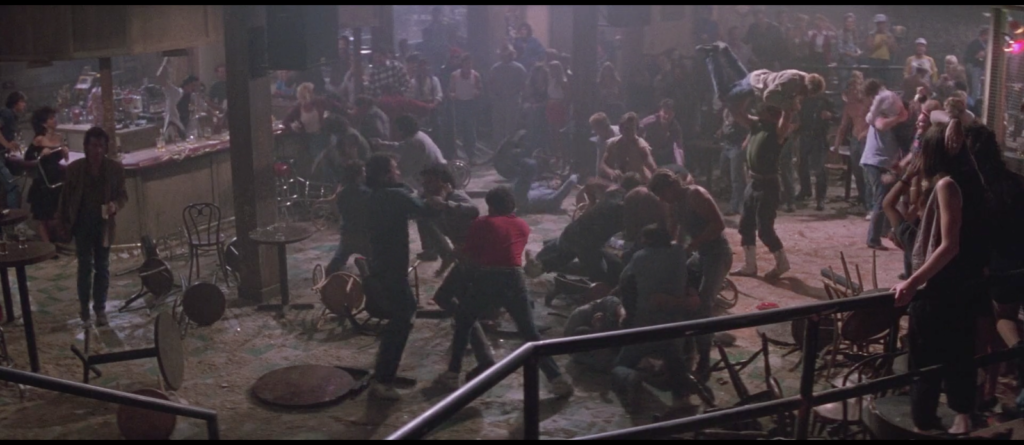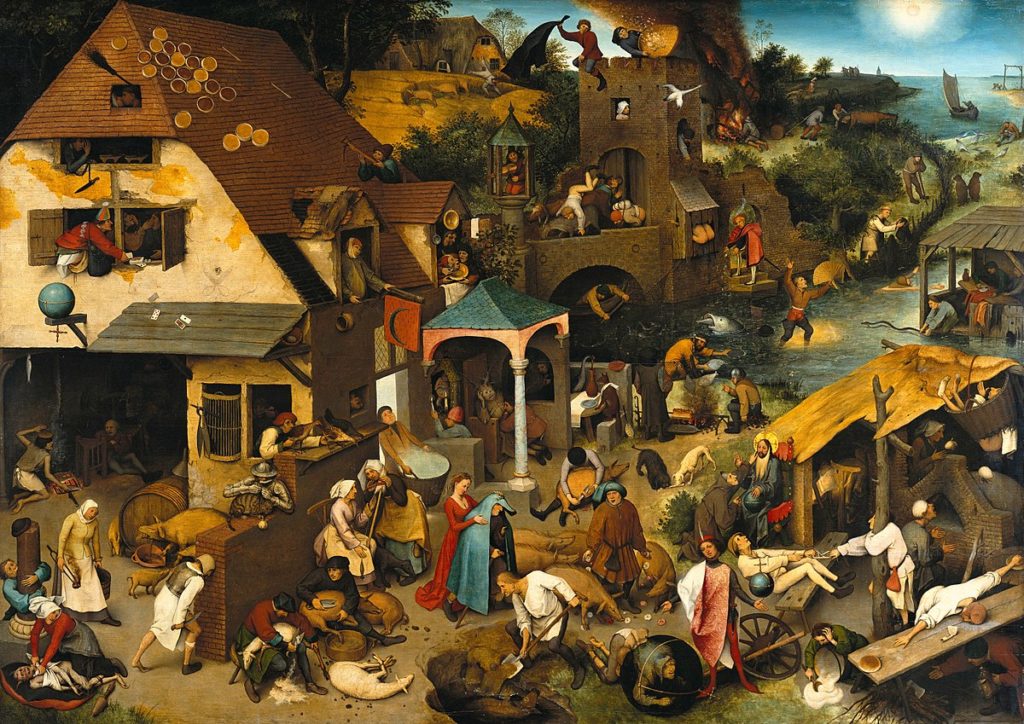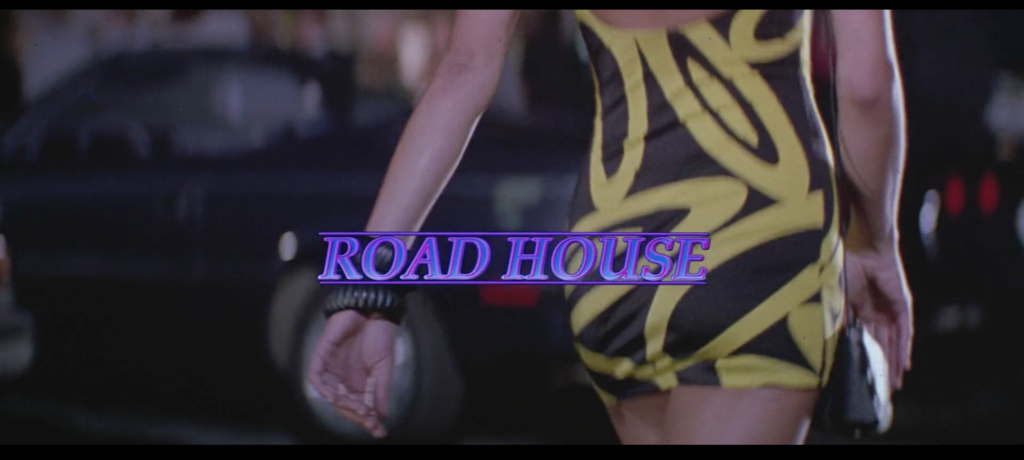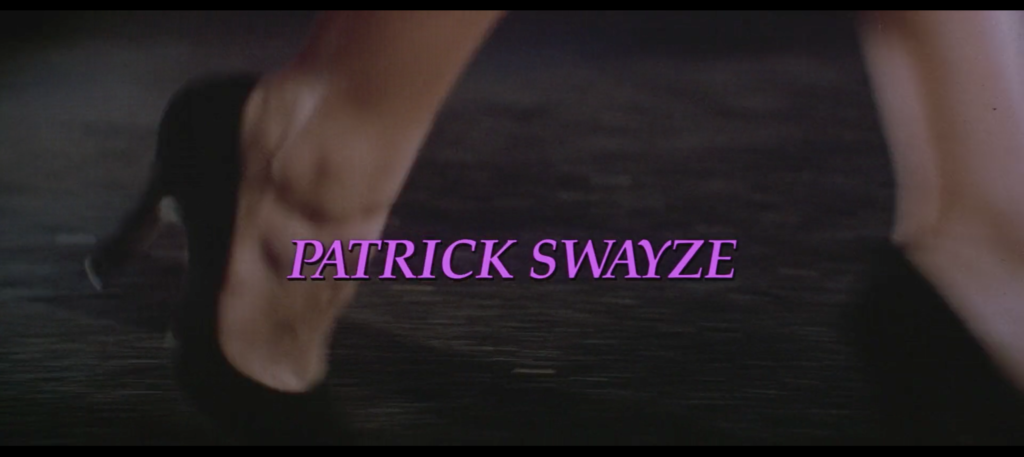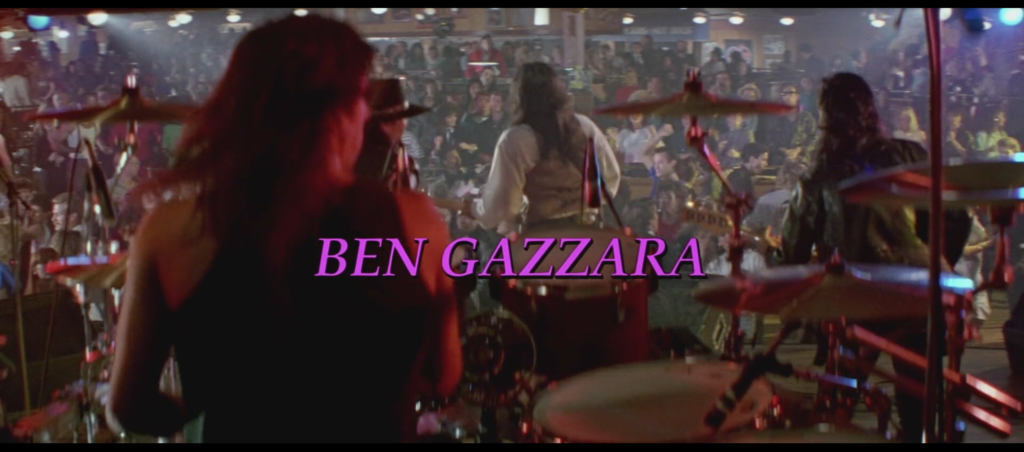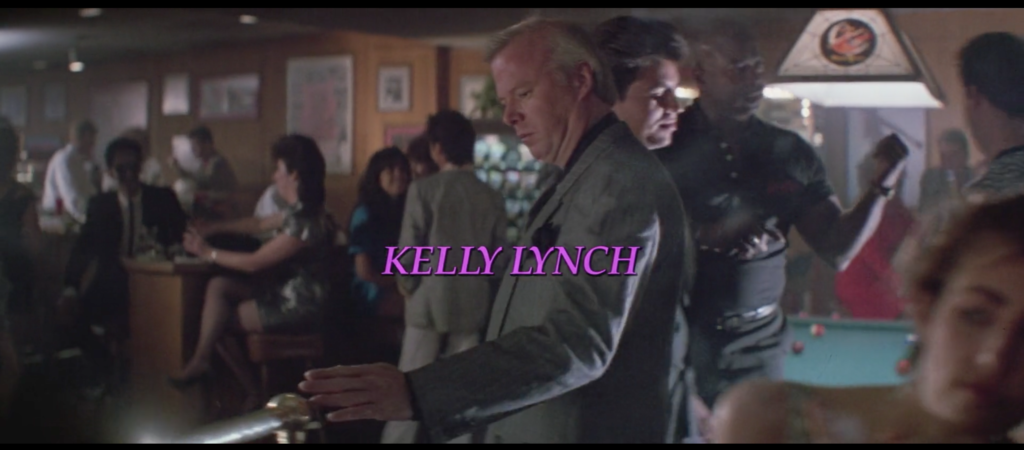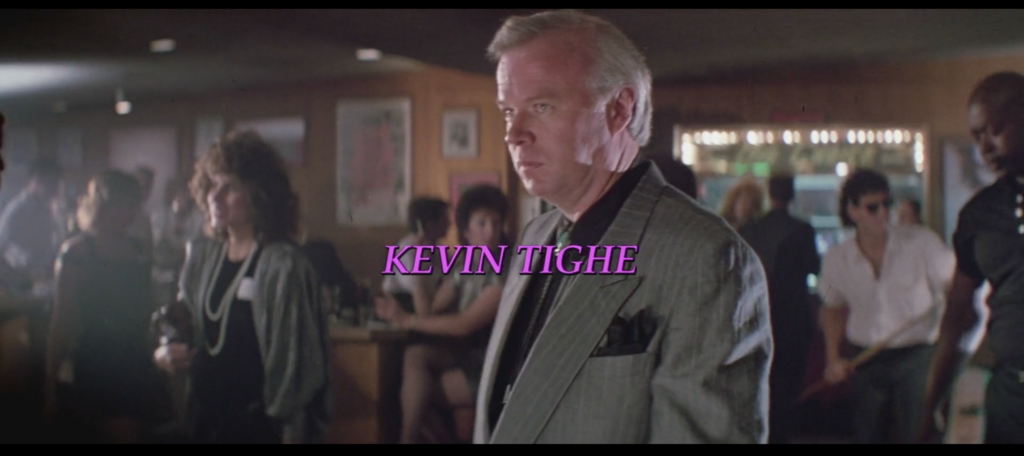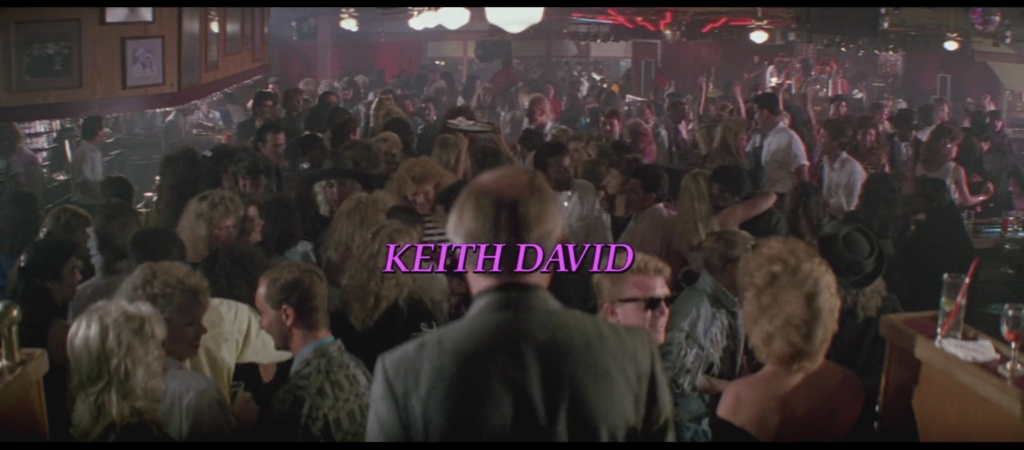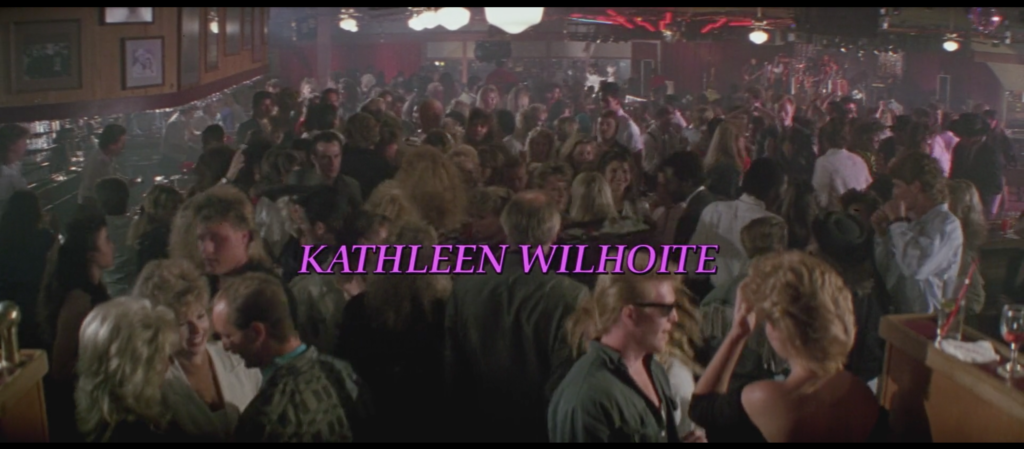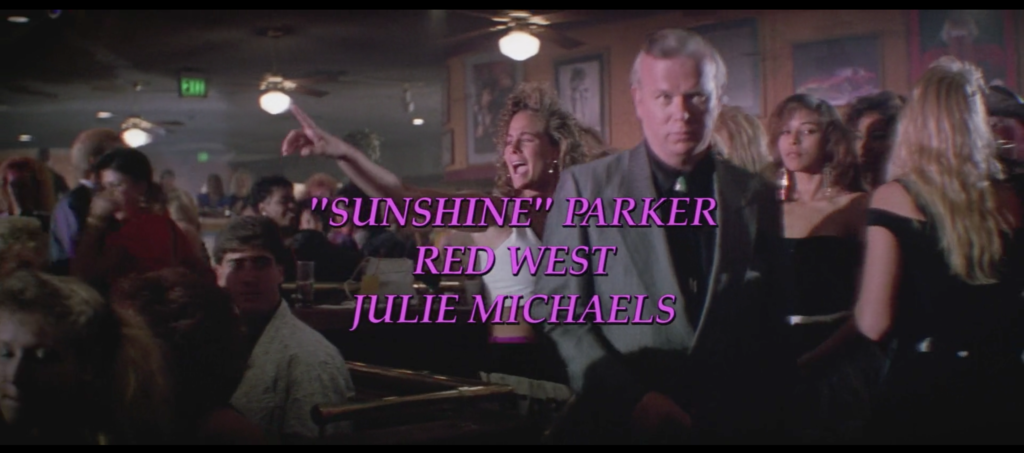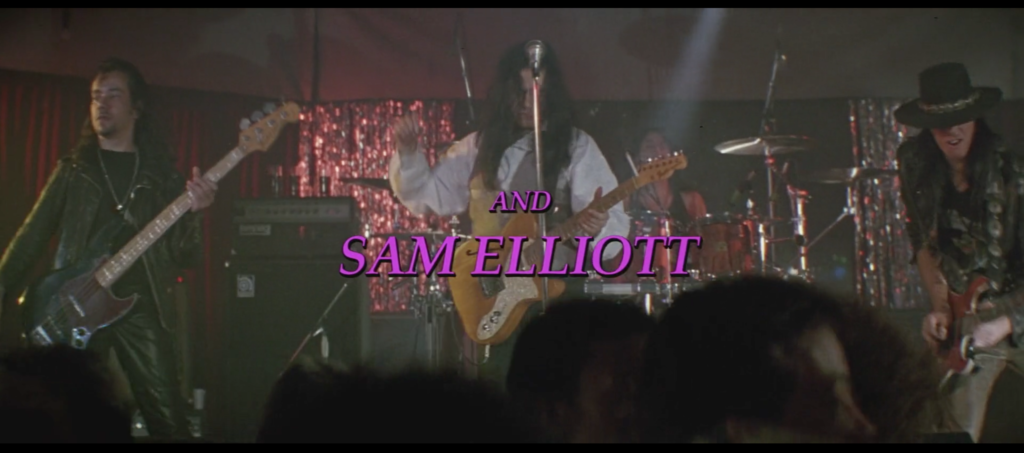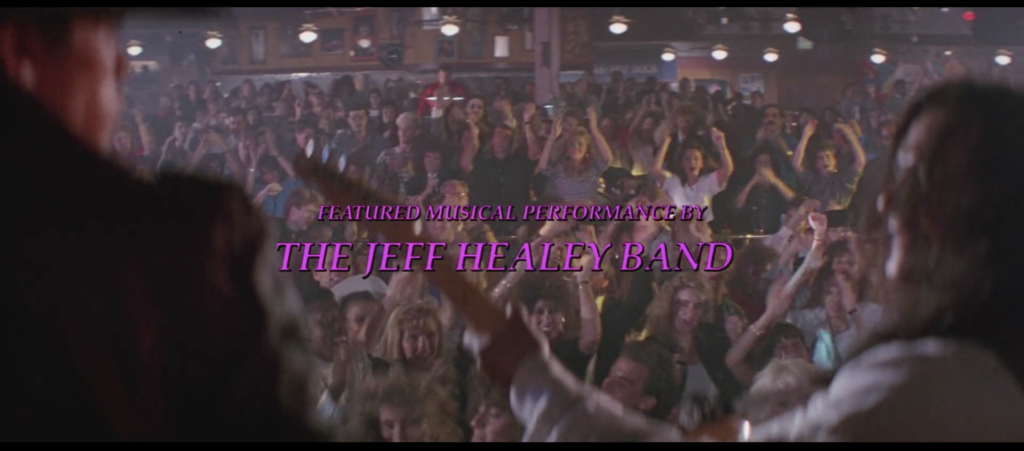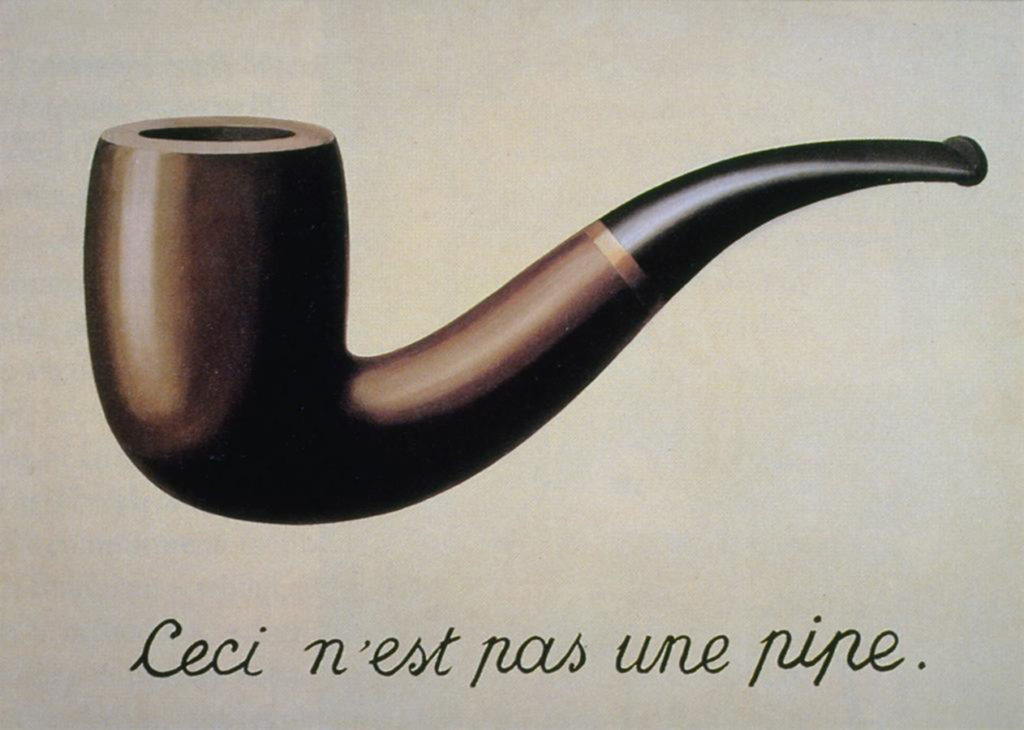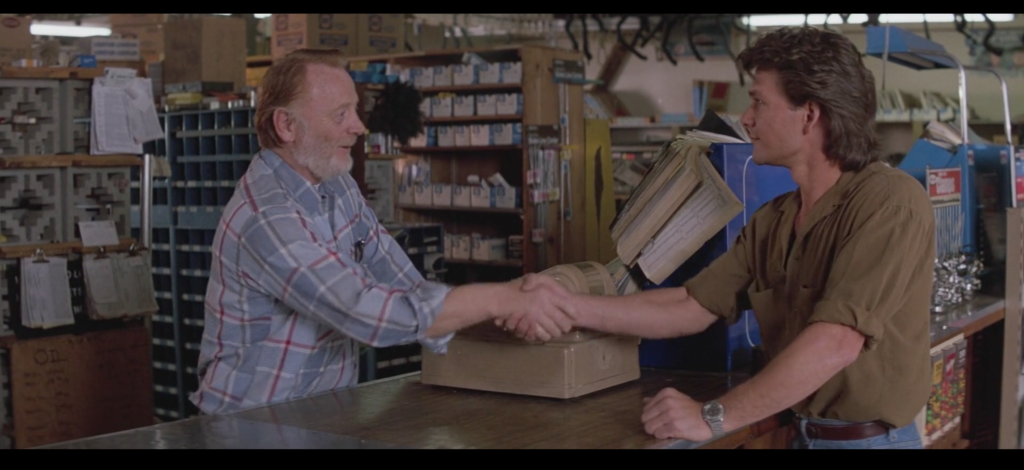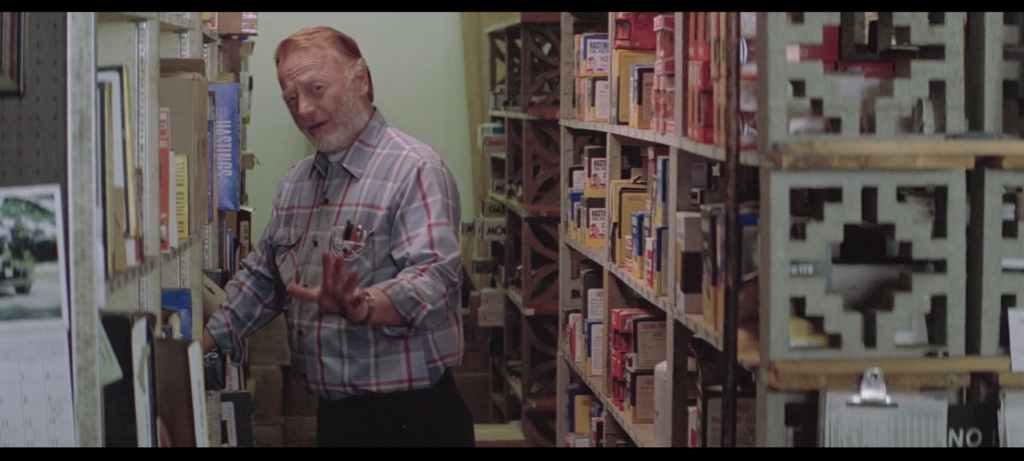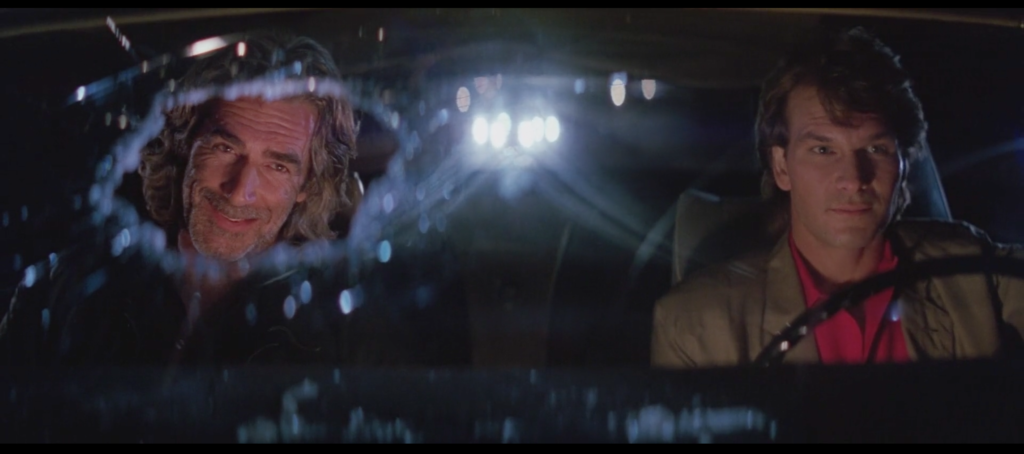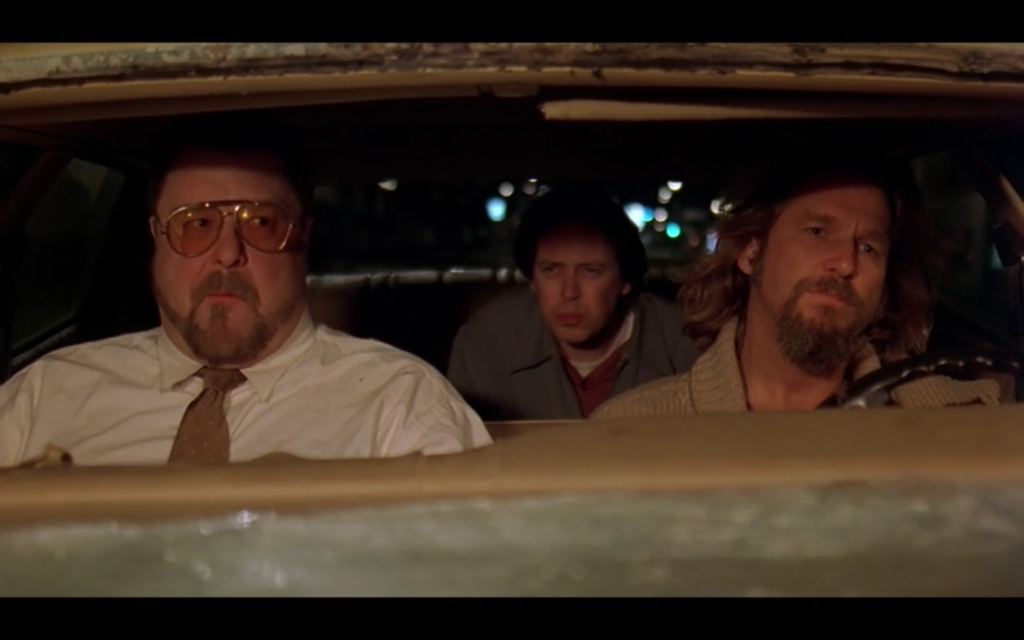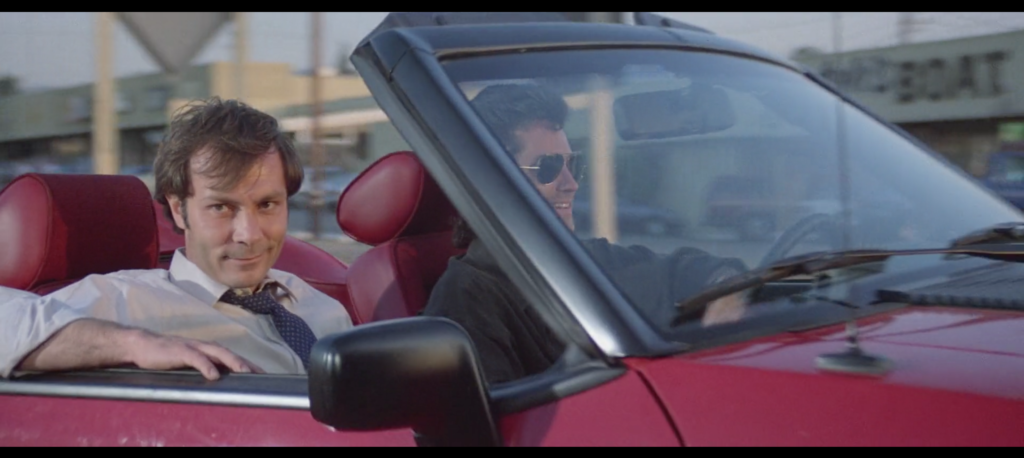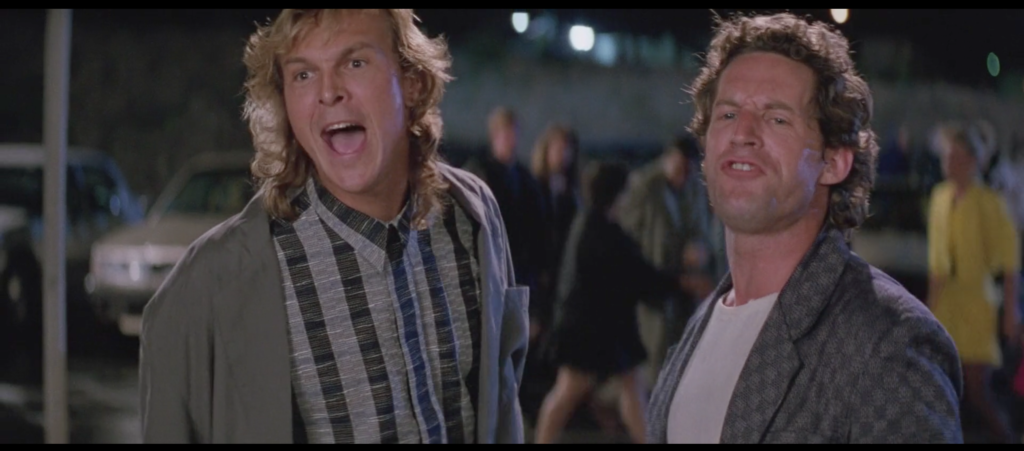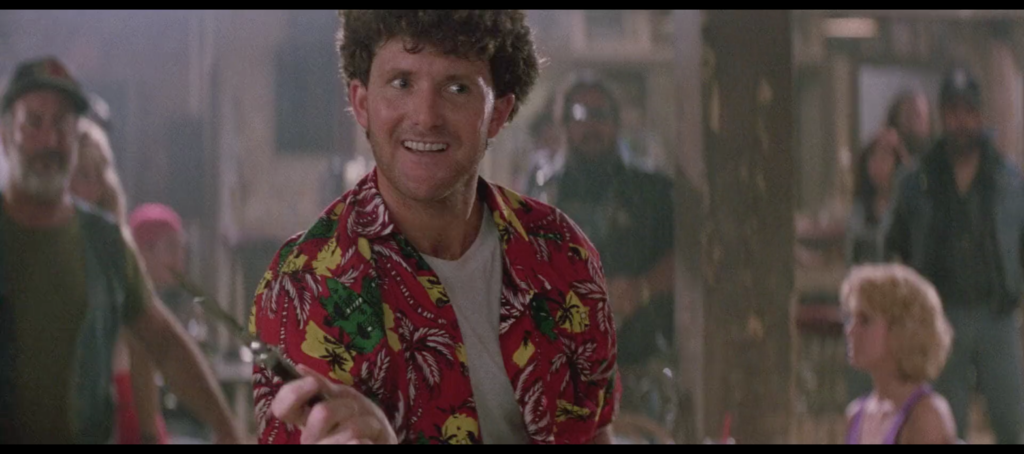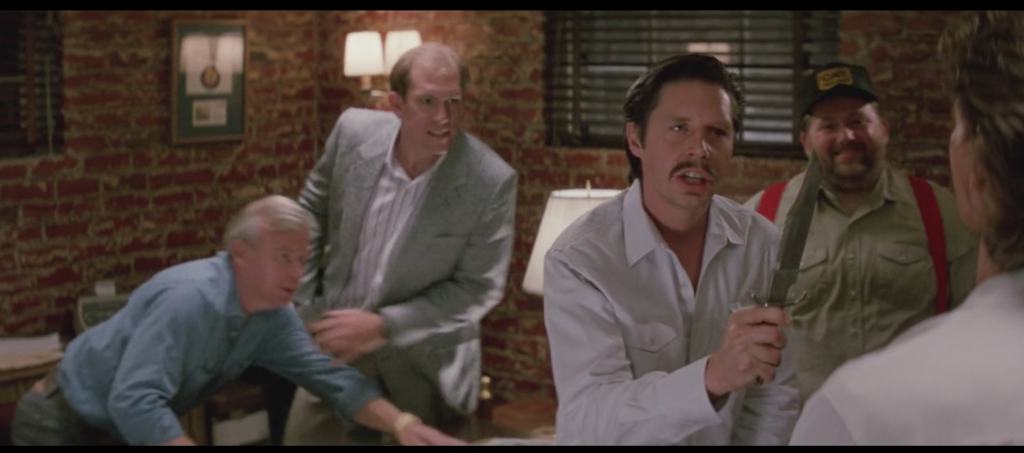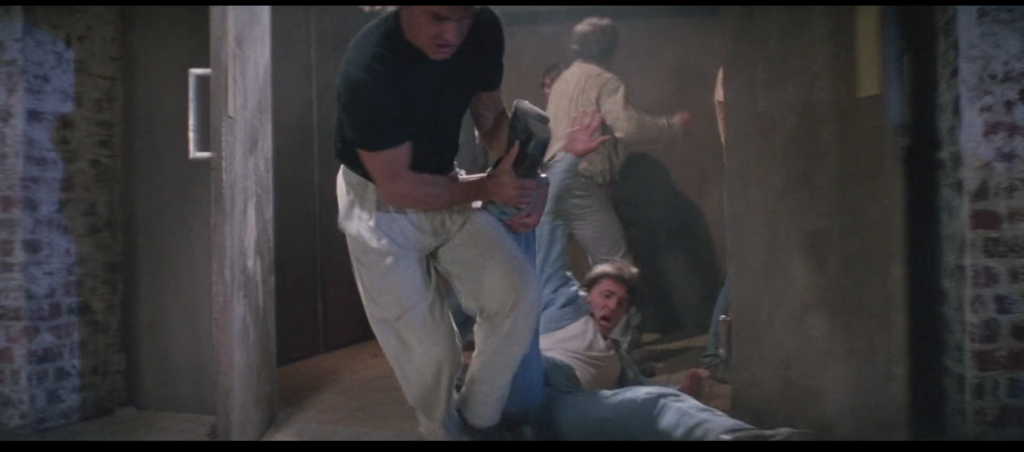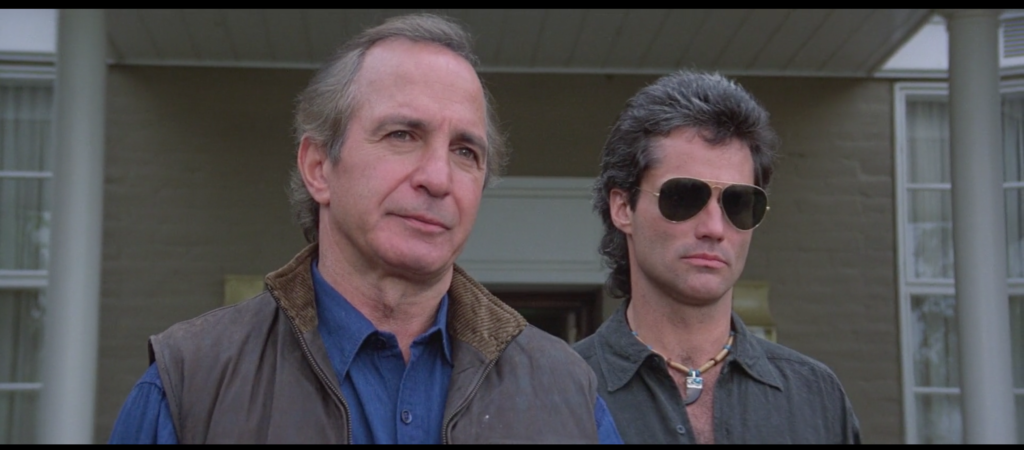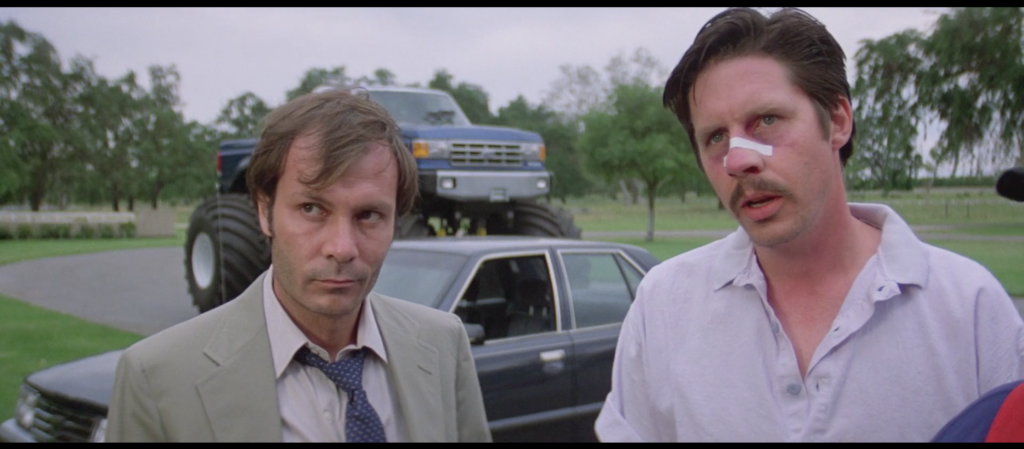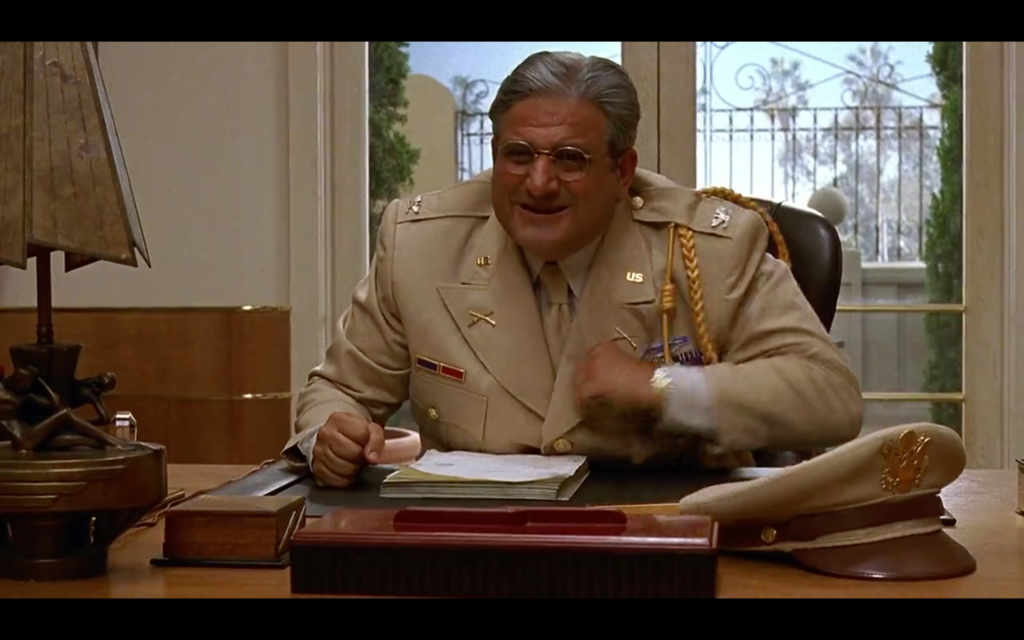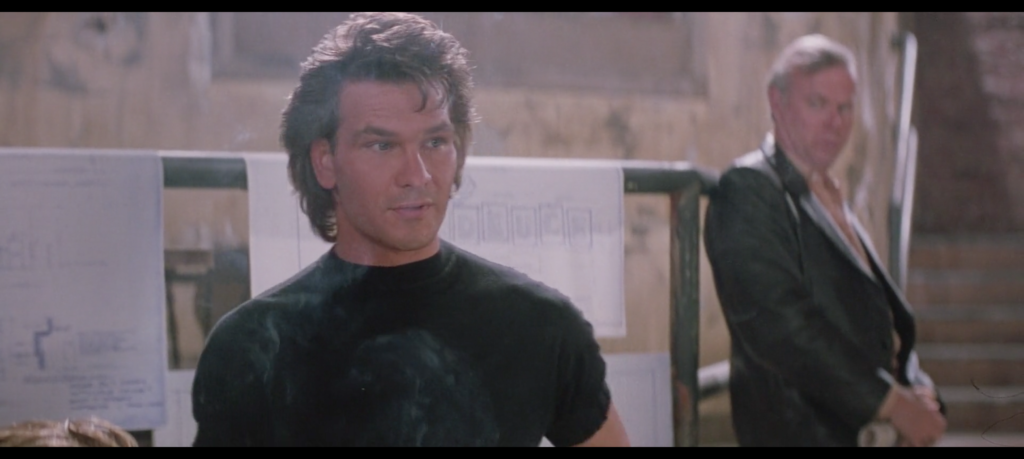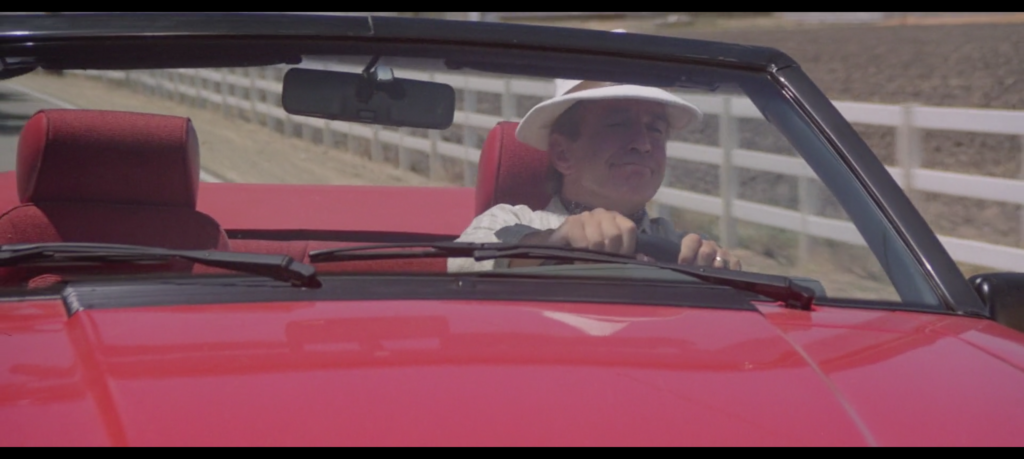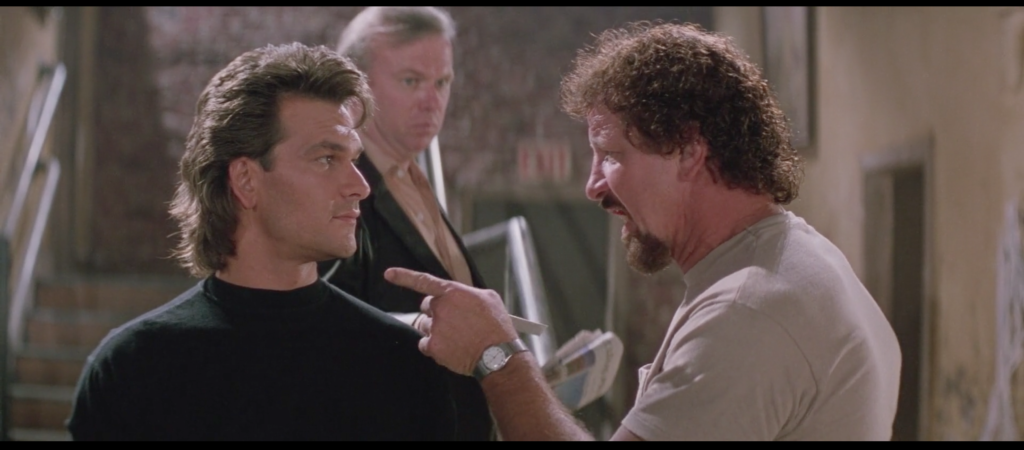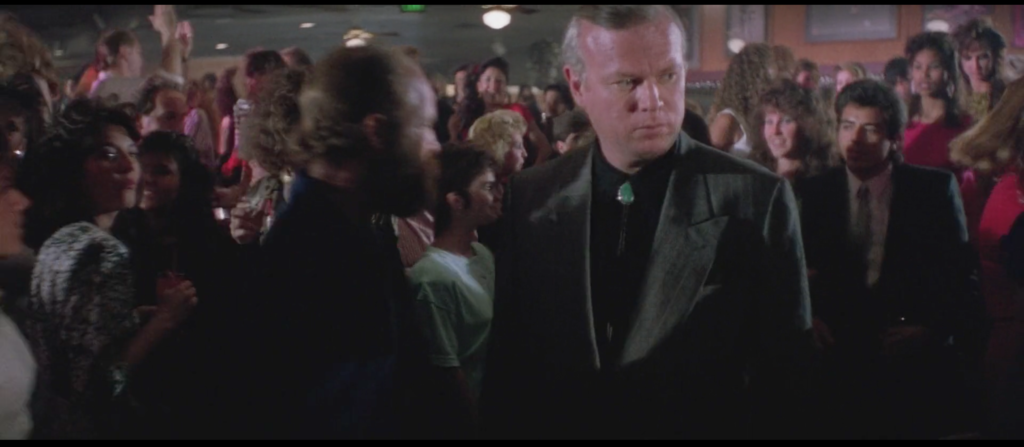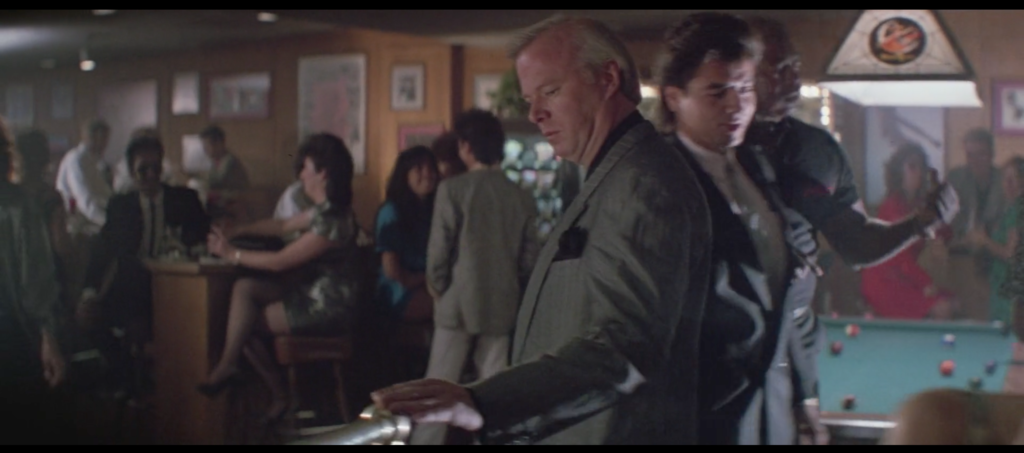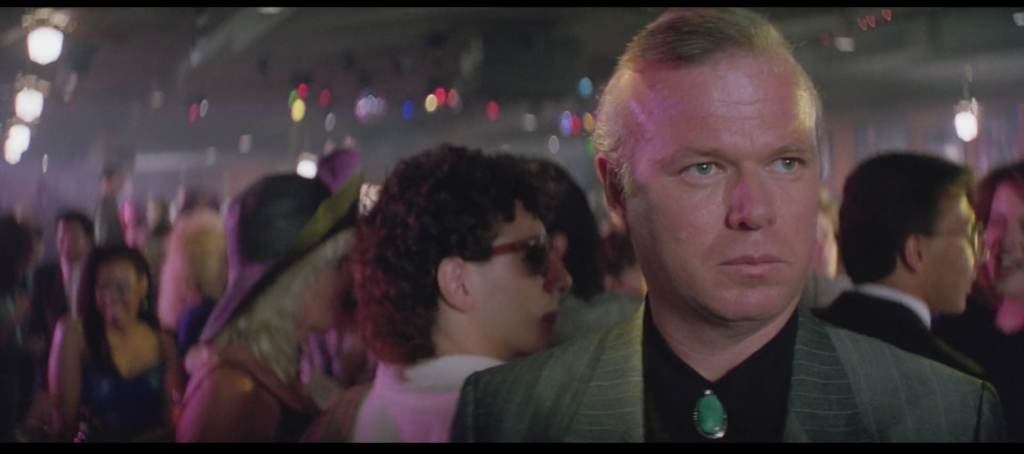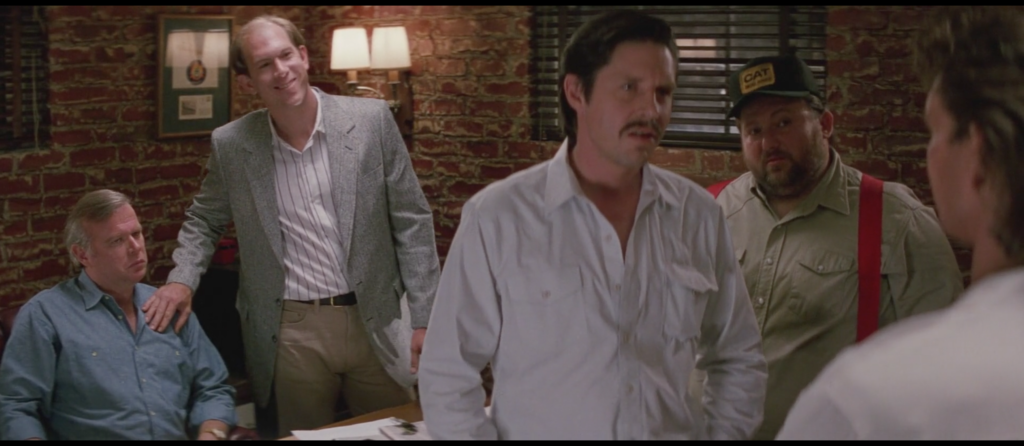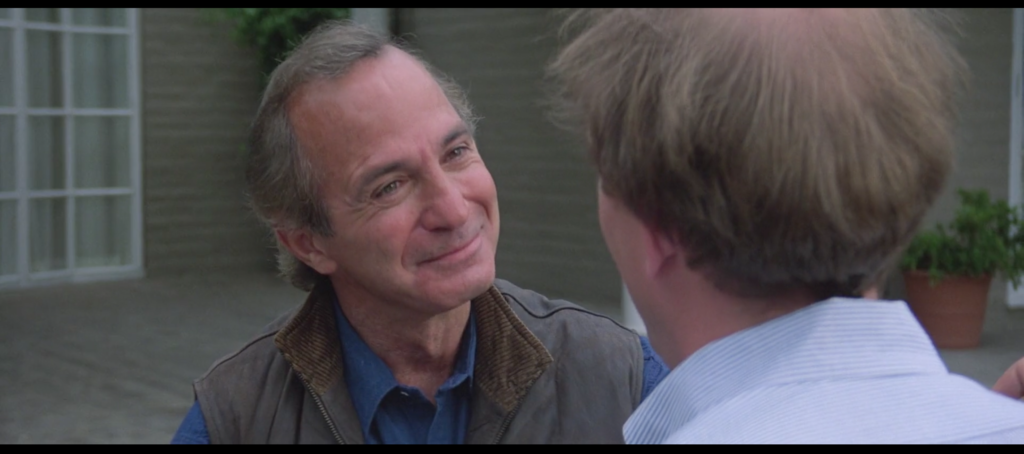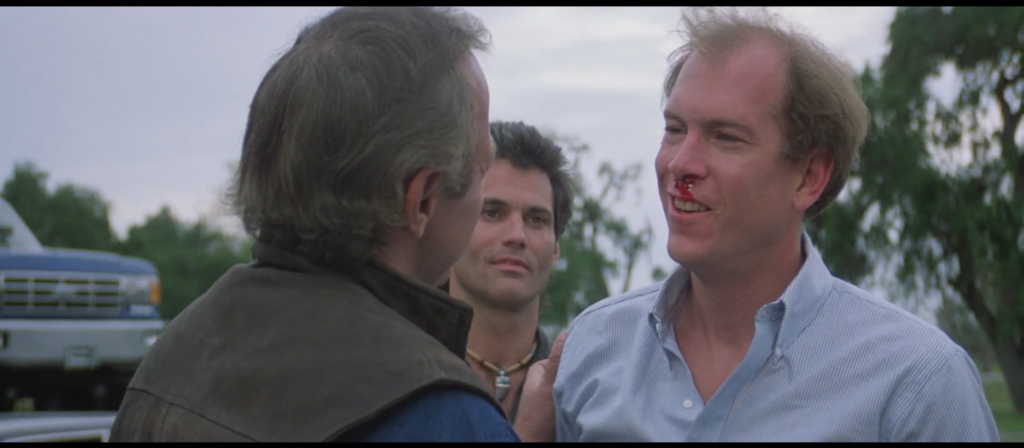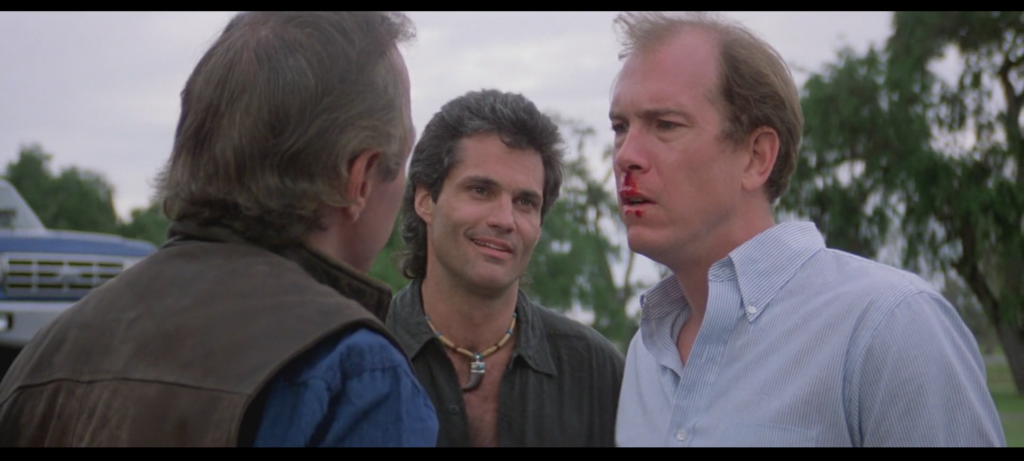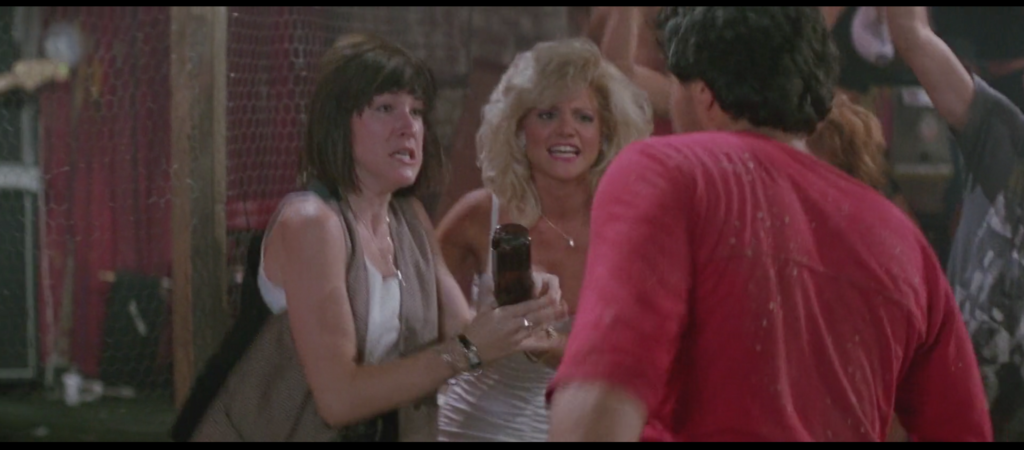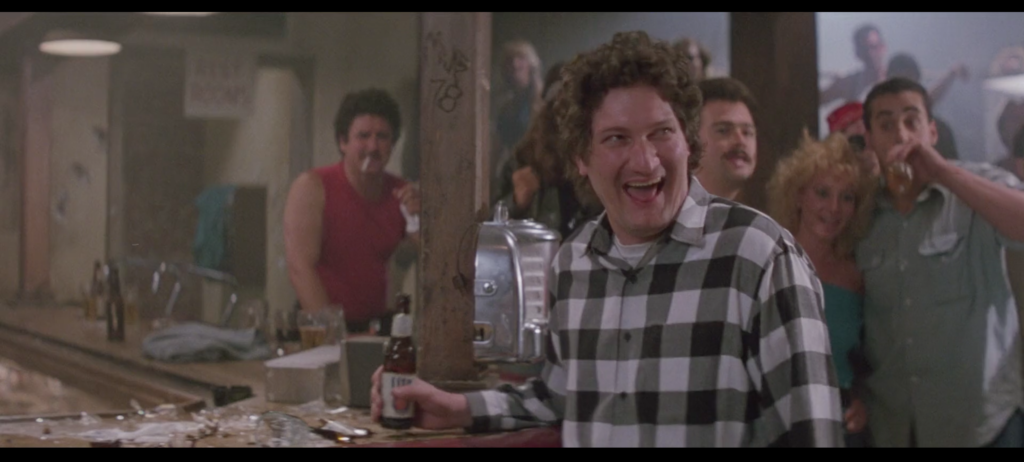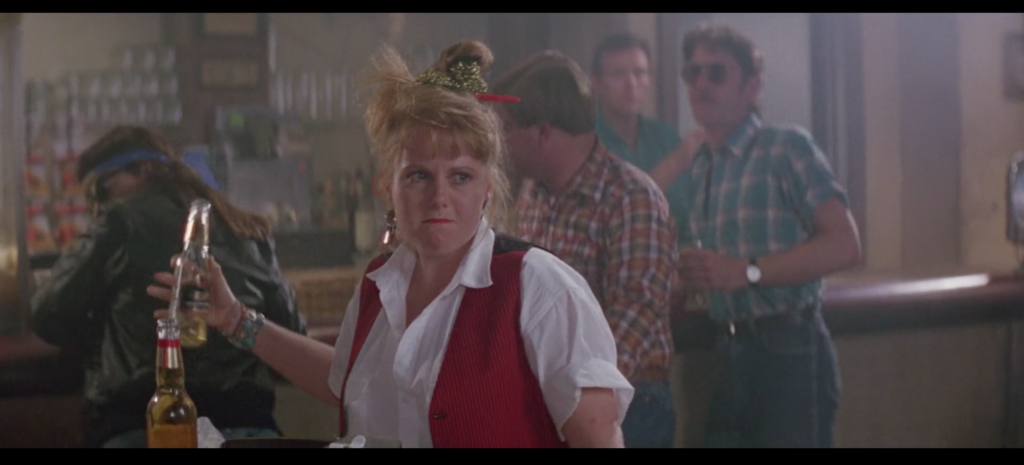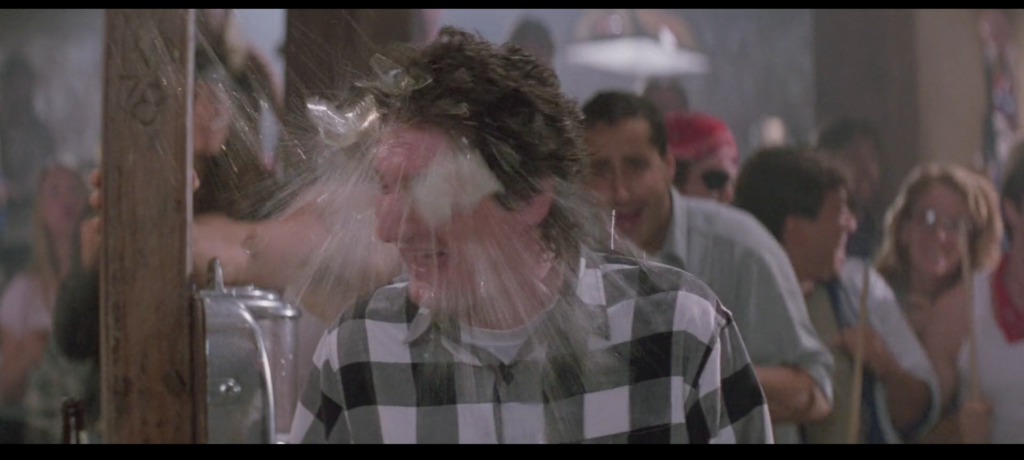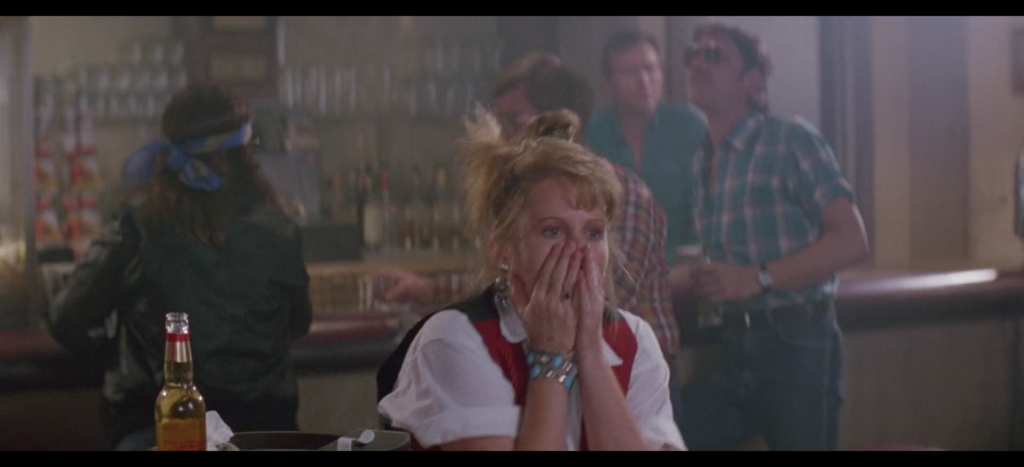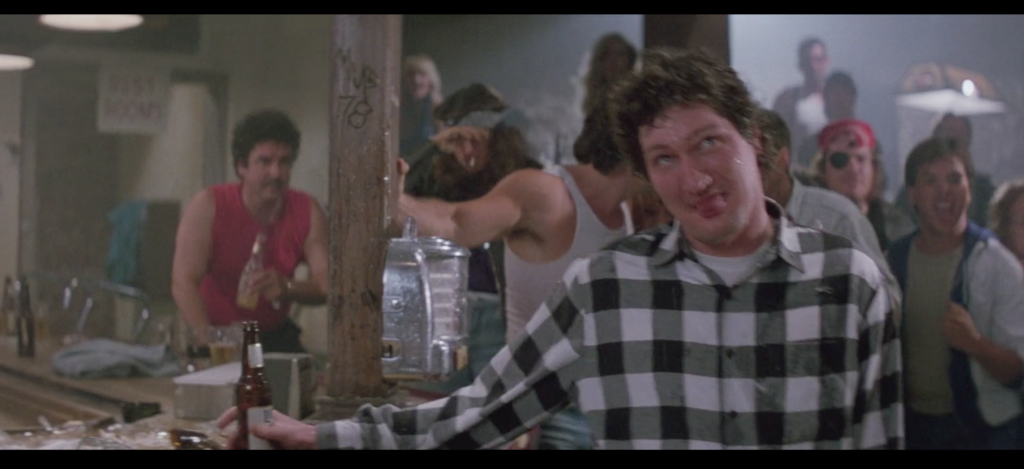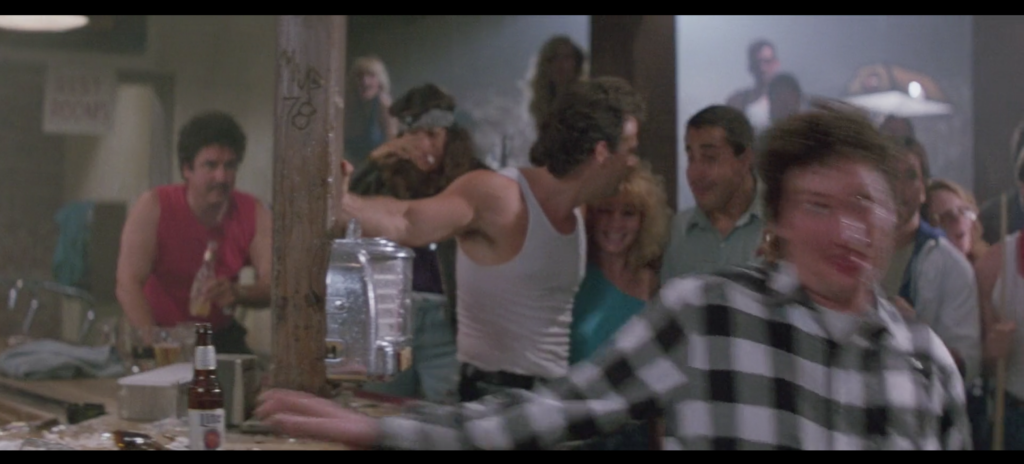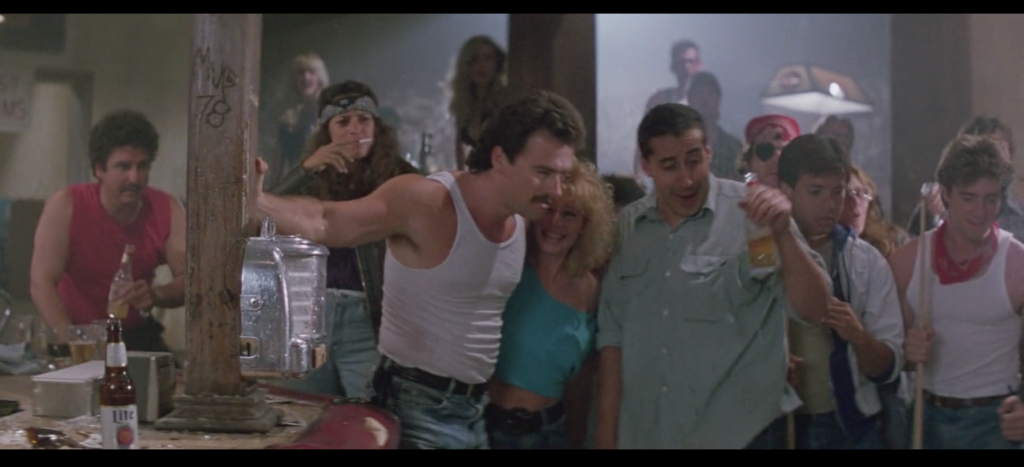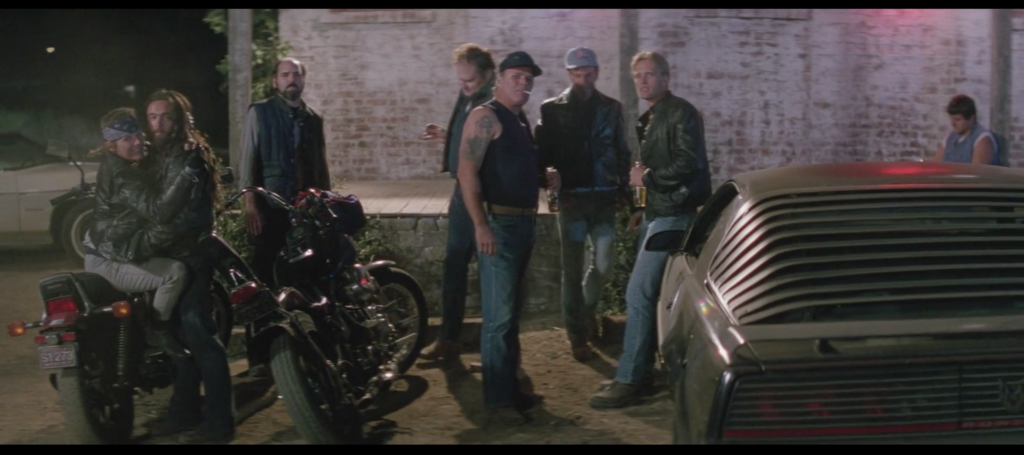Archive for the ‘Pain Don’t Hurt’ Category
020. Nothing personal
January 20, 2019“I want you to remember that it’s a job. It’s nothing personal.” We’ll be exploring of Dalton’s three simple rules for bouncing my Jasper road house in depth as the year progresses, but this elaboration of Rule Three, “Be nice,” bears scrutiny here in this early stage of the game. If you want to know what Dalton’s about, you need to see how seriously he takes not taking things personally. For now.
On Dalton’s first night on the job—the night of the Giving of the Rules—he makes a lot of enemies. He fires Morgan the bouncer for being a rat-bastard sadist and Pat McGurn the bartender for stealing from the register; both these men are members of the Wesley outfit and will repeatedly attempt to murder Dalton for costing them their jobs at what is, let’s face it, a complete shithole. He fires Steve the bouncer for having sex with teenagers on the job and he fires Judy the waitress (not that anyone ever says her name in the movie, of course) for dealing drugs on the job; neither shows up again but it’s hard to imagine losing their sexually and/or financially lucrative side hustles along with their day jobs sits particularly well with them. He also encounters a man who reacts to being asked to escort his girlfriend off the table she’s dancing on by whipping out a switchblade and threatening to stab a bouncer to death, and uses this man’s face to break a separate table in half before throwing him out; provided he hasn’t suffered a brain injury, my guess is he’s pissed off about it.
So there’s no surprise, and no shortage of suspects either, when Dalton walks outside and sees that his new car has had its windshield shattered, its antenna broken, and all four of its tires slashed.
Dalton saw this coming, of course. As previously mentioned, he makes it a habit to buy a beat-up used car while he’s working, knowing how the people he alienates tend to react. But this isn’t grudging acceptance of a bad situation, the way you might grumble standing on line at the grocery store the night before a big snowstorm. When Dalton sees what’s been done to his car, which will require him to jack and replace all four tires at a minimum before he can even think of addressing the other problems, he simply smiles and shakes his head. He’d shoot the same you-gotta-laugh look if he had a toddler who just covered her hair with peanut butter.
This is the face of a man who has a job, who does the job, and who does not take the job personally. His background in philosophy might help. Same with his study of tai chi. And in general he reverts to “laid back” as a default setting when external stressors are absent. And I mean that literally: When Wesley sends his goons Tinker and O’Connor, who recently tried to murder him and got their clocks cleaned for their troubles, to fetch him for a sit-down, he’s lying on the car that their fellow goons most likely vandalized the way a normal person might relax on a hammock.
But the “it’s a job, it’s nothing personal” thing is crucial to understanding the transformation Jasper, Missouri forces him to undergo. With each scene, you can watch his progress from one end of that spectrum to the other. Just know that this is where he starts.
021. Welcome to Jasper
January 21, 2019
It would be incorrect to say that the “Welcome to Jasper” sign situated atop a clock in the town’s main thoroughfare is the sight that greets Dalton when he first drives into town, because he’s driving into view from the opposite direction. This leaves us with two possible interpretations. Either he’s driven clear across town from one end to the next just to take the place in and we’re catching up with him as he hits the opposite border from where he started, or this sign is an ad hoc affair in a shot the logic of which was not exactly thought through by the film’s director. Considering the strange effect cars seem to have on the amount of sense the movie makes at any given time I lean towards the latter interpretation.
Be that as it may, I hope Dalton caught it in his rearview mirror as he passed by, because it tells him a lot about the town, and the main body of the movie, he’s about to enter. The bright green neon signage is an unusual choice, either for a border marker or for a greeting from the town’s main shopping district. It evokes the neon of the Bandstand sign more than the wooden billboard paid for by the local Rotarians. That, at least, I believe was intentional on the part of the filmmakers. You are entering a Road House town.
The neon itself rests atop a tony-looking Seth Thomas clock. The same manufacturer created the clocks that greet travelers in Grand Central Station. It’s emblematic of both a bygone time and the promise the future held during that time, a past-future when it was possible to go anywhere and be anyone. The neon, too, has its own retro connotations, more sock-hop than Beaux-Arts. They don’t match up.
The combination makes sense only in the context of the film-Jasper’s crazy-quilt approach to authenticity. This is a town of bearded old codgers who raise horses, and also have expensive faux-rustic loft apartments in their barns, located directly across the water from mansions with property big enough for helicopters to land on. It’s the home of countrified fellas named Red who run small auto-parts stores and huge Ford card dealerships, both of which are held up to be models of small-business entrepreneurship against Brad Wesley’s chain-store depredations. It’s a place where one dive bar out of several that we visit can be the stomping ground of a clientele straight out of The Road Warrior one month and a mecca for nightclubbers who pay top dollar to see a blind white boy play the blues the next, predicated on the garish design sensibilities of the bar’s rich owner and the ability of the bar’s cooler to settle all problems in the town with violent force.
And you know that “main thoroughfare” bit? Who knows! I basically made that up, since we never see this place nor anywhere remotely like it ever again. This crowded stretch of commercial development with decent walkability and the network of dirt roads, junkyards, and greasy-spoon diners the rest of the movie traverses have about as much in common as, well, the clock and the neon sign. But each stretch of road broadcasts realness.
Dalton intuits this, which you can see in the way he self-effaces regarding his fancy degree from New York University, but takes the ancient practice of tai chi directly to the shores of Jasper’s lake-river. By turning the sign away from Dalton’s point of view at this early moment, Dalton’s status in the town is left an open question—one quickly answered, true, but that answer is earned. Dalton is welcome in Jasper.
Brad Wesley talks a good game about small-town values and that old time rock and roll, but everything else about him—riding in a chopper, erecting malls, interacting with nature primarily by killing, stuffing, and mounting wild animals from around the world rather than the good ol’ USA—does not. This makes him an interloper, an occupier, a colonizer, someone as out of place in Jasper as a Calvin Klein’s Obsession ad would be below that neon sign and Seth Thomas clockface. Brad Wesley is not welcome in Jasper.
But you are welcome in Jasper, dear viewer. You are welcome here from the start, trusted by the town to take it into your heart in all its complementary contradictions. You must be, because it’s the only way to move forward and drive on to what awaits.
022. An elevator in an outhouse
January 22, 2019“Callin’ me ‘sir’ is like puttin’ an elevator in an outhouse: It don’t belong.” So says Emmet, Dalton’s prospective landlord, to Dalton, Emmet’s prospective tenant, soon after they meet. Dalton is unflaggingly respectful to those his cooler-sense tell him deserve respect. Emmet, with his overalls and scraggly beard and extremely menacing hay-hooks, is such a fellow, hence Dalton’s use of that three-letter term of deference. Emmet in turn is determined not to put on airs, even at the expense of seeming less of an authority figure in the eyes of someone in whom he must trust to behave himself on their shared property on whom he will soon depend for income. In a minute or two he will rent Dalton a massive, fully furnished loft apartment for $100 a month, which is one-fifth of what Dalton makes every day, so he’s clearly willing to forego other markers of landlordism too. But in the meantime, an analogy that has never before passed the lips of man will have to do. I’d say it’s a singularly odd and vulgar expression to coin, but we’ve got “balls big enough to come in a dumptruck” and “does a hobbyhorse have a wooden dick” and “I used to fuck guys like you in prison” to contend with in this film alone, so “singularly” is out. Still, this is our first taste of Road House‘s penchant for turning a phrase until it gets dizzy and collapses, and thus it’s a memorable one.
But it wasn’t until yesterday, writing about the sign that welcomes weary travelers to Jasper, that I got to thinking about how well the expression sums up the existence of Emmet and Dalton’s soon to be shared enemy, Brad Wesley. Like an elevator in an outhouse, Wesley represents the intrusion of commodification (as opposed to commode-ification) and technological overreach in the Jasper ecosystem. His house is the biggest house. His businesses are the biggest business. His goons are the biggest goons. His truck has the biggest wheels. Were he to construct an outhouse, an elevator is not out of the question.
What’s more, so many of his scenes are literal intrusions into places he does not belong: the opposite lane of traffic, the post-cleanup Double Deuce, the auto parts dealership run by the uncle of his ex-wife, Pete Strodenmire’s Ford showroom, and—most importantly, since the “elevator in an outhouse” exchange is bookended by it—the airspace above Emmet’s ranch. As Emmet and Dalton meet and negotiate, Brad buzzes them with a helicopter that, like his in-ground pool and his monster truck and (one presumes) his JC Penney, feels about as out of place in this environment as…well, you know.
Brad Wesley livin’ in Jasper is like puttin’ an elevator in an outhouse: He don’t belong. If you’ll permit me to take the analogy one step further: No matter how far up he may go, he’s still just a pile of shit.
023. Valet
January 23, 2019This man is Chino “Fats” Williams. A character actor with a string of bit parts from the ’70s through the ’90s, he appeared as a character called Fats in four different projects, from Baretta to House Party. In Road House he’s billed as “Derelict,” which coincidentally or not is the same title he receives in Rocky III, the third and final installment of that franchise in which he acted as a downwardly mobile person. It is unclear whether he was playing the same person in all three Rocky movies, and equally unclear if the Derelict from Rocky III is the same Derelict from Road House, and thus if Wade Garrett and Ivan Drago exist in the same cinematic universe. An enterprising mid-tier comics publisher should look into the rights situation, because that is the crossover event of the century right there.
Be that as it may. Dalton knows none of this when he drives up to the New York parking garage where he stores his Mercedes, which he plans to take to Jasper. By now you’ve read enough to know that he always stashes his fancy ride away when he’s working so that angry customers don’t take out their frustrations on it, replacing it with some old beater or other, the way you wear a ratty old t-shirt to do serious housecleaning or what have you. This means that after quitting the Bandstand and agreeing to work the Double Deuce, he has to get rid of his New York jalopy before he can head for Missouri.
He does this by parking in front of the garage and tossing his keys to the above individual, who’s seated comfortably outside the garage entrance. Both confused and irritated, the man says to Dalton, “What do I look like, a valet?”
The answer, frankly, is yes.
He is sitting expectantly in front of a parking-garage entrance in the middle of the night on an otherwise empty street. God knows what else he’d be doing there.
But this is beside the point. The important thing about Chino “Fats” Williams and his Derelict role is the voice with which he says his one line. The best way I can describe it—and I’ve thought about this for years—is that he sounds like if Statler & Waldorf from The Muppet Show gargled with razor blades and then sucked down a bunch of helium. “Elderly frog angry about getting thrown out of a bar for chainsmoking” could work as well. The man has the most memorable voice in the movie, which I remind you also stars Sam Elliott, Terry Funk, Kevin Tighe, Ben Gazzara, and Keith David (kinda). He may or may not look like a valet, but he sounds like no one else on earth.
Anyway, turns out Dalton neither knows nor cares who he is. He tossed the guy his keys because he’s giving him the car. “Keep it, it’s yours,” says the nation’s second-greatest cooler. “Mm?” murmurs the Derelict quizzically. “Mm,” he responds to himself firmly. With a little “Well, alright, if you insist” shrug, he gets up and heads to the car. Apparently he has places to be, though you wouldn’t have known it from the fact that he’s sitting by a parking-garage entrance alone in the middle of the night like…well, you know.
024. Mr. Clean
January 24, 2019Dalton’s first visit to the Double Deuce is, it’s reasonable to assume, a representative view of the establishment’s clientele. He is harassed in the parking lot by a gang of bikers angry at him for driving a Mercedes instead of Detroit steel. Inside the bar he passes two women pawing at their noses clearly after powdering them in the ladies’ room. (A minute or two later we see them approach the Double Deuce’s resident drug-dealing waitress to purchase the cocaine they just used, a transaction she tells them she will complete in the ladies’ room. I suppose it’s possible they just needed more and not that they entered the Moebius, a twist in the fabric of space where time becomes a loop.) He sees a hayseed who looks like Jeff Foxworthy sexually harass his future friend and Dionysian acolyte Carrie Ann. He watches Regular Saturday Night Thing Steve refuse to break up a rolling-around-on-the-ground fight because the participants are brothers.
The first person to actually acknowledge the presence of Dalton inside the Double Deuce is a man who is cueball Kojak bald, at a time when that was still unusual enough to be striking. When Dalton parks himself at the corner of the bar nearby, this fellow gives the newcomer a polite wave hello. He then stands up, tucks his chin against his neck in the fashion of someone who has just involuntarily re-tasted an hours-old meal, and raises his eyebrows like he’s surprised he’s still mobile. He is drunk as a lord. He toddles away in the fashion of a person who is mustering literally all of his physical and mental energy just to make it to the bathroom without exploding out of both ends.
I think of this guy as Mr. Clean, for obvious reasons, and for lack of a better descriptor. And why not? Despite being both friendly and nonviolent, he’s nevertheless exactly the sort of 40-year-old adolescent, power drinker, felon, and trustee of modern chemistry Dalton will go on to tell his underlings it is their job to expel from the Double Deuce forever. Dalton is here to clean up the likes of Mr. Clean.
Yes, Mr. Clean offers Dalton a comparatively warm welcome, before lurching out of frame and out of the film forever. What of it? This will hardly be the last time that those Dalton must destroy approach him in the guise of friendship. In the words of Dalton’s First Rule: Never underestimate your opponent. Expect the unexpected. Including a polite little wave hello.
025. Tableau
January 25, 2019Though Dalton gets stabbed within the first few minutes of Road House, it would be incorrect to refer to the incident as a fight. He weathers the cut with stoic grace, lures the wielder of the blade into the parking lot of the Bandstand under the false pretense of giving him the honor of a mano a mano throwdown, and then walks back inside, closing the gates of paradise behind him with a row of mountainous bouncers.
The real first fight occurs about 15 minutes in, when Dalton first arrives at the Double Deuce. Let us leave aside the manner in which the fight begins, for now; suffice it to say it involves the violation of a verbal contract and a subsequent falling-out between the negotiating parties. Let us also avoid discussion of the fight’s particulars, each of which will likely receive an entry of its own. Here our focus is on the fight’s gestalt. As much as the Shirtless Man or the Four Car Salesmen or the Bouncer Fame Index, it is an indication of the kind of movie you’re watching, and the most visceral and ambitious one at that. And it indicates this: You are watching a movie in which barfights achieve the colossal scale and cacophonous visual intensity of a painting from the Flemish Renaissance.
While, again, avoiding the instigating incident and the individual fight choreography beats, the effect of the first fight is intoxicating—a vertiginous ramping-up of wanton physical stupidity and destruction, from a starting point that is incredibly stupid itself, that simulates the effect of consuming an heroic amount of intoxicants in a time short enough to be the length of a song from Wire’s Pink Flag.
The first time I watched Road House I’d heard about it for a couple of years from the friends who wound up introducing me to it, but really had no idea what the fuss was about. By the time the first fight was over I wondered no longer. While I imagine there are those who do not give themselves over to the movie after this scene, I was not one of them, nor do I truly understand what it would take to be one of them. There’s no resisting the howitzer blast of shattered bottles, smashed tables, flying bodies, and punched heads you witness here, nor the rogues gallery of one-off stuntpersons who produce them.
And while Dalton himself stays out of the fray, watching it all unfold with the sangfroid only America’s second most famous bouncer could muster, you the viewer are afforded no such luxury. You pinball around with the camera as every act of stupendously dumb violence is rubbed right in your face. As a collection of individual moments, shots, characters, punches in the head, it’s truly impressive.
But when the camera pulls back and the full scale of the devastation is revealed for the first time? Breathtaking. Staggering. Clarifying. In that one moment you mentally whip-zoom from the trees to the forest, the way you might look back at a particularly harrowing stretch of events in your life and think “my god, how did I ever make it through?” The parts overwhelm moment to moment. The whole overwhelms on a whole other level, yet none of the parts are concealed. Everything is happening.
And you’ve emerged on the other side, with roughly a Tilghman’s eye view of the conflagration. You see the magnitude of the task Dalton has taken on, even as he casually strolls through the still-raging slobberknocker to confer with the bar’s owner. You see the movie you’re about to spend another hour and a half watching, itself a collection of individual moments, shots, characters, and punches in the head—just as chaotic as this one image, and just as cohesive a statement.
026. The Treachery of Images
January 26, 2019This is not a Road House. This is a woman’s ass. Other than a few moments that are so comically over-the-top they seem custom-built for people who use words like “bazongas” Road House does not really go in for random gratuitous objectification of women as a rule. In most instances where a man leers at a woman, that’s as sure a sign that bad shit is about to go down as the “DUNNNNNNN DUNN” string hit in John Williams’s score for Jaws. But this is where the title card devised by R/Greenberg Associates—the same company that designed the all-timer titles for Alien and Altered States—winds up.
This is normally the part where I come up with some deep-dive close-read no-prize explanation for the weird thing Road House just did. I’m hard pressed, however, to argue anything other than “they thought it would be fun to rile up the rubes by slapping the movie’s title across a woman’s butt.” I’ve seen this movie with enough people to know it usually succeeds in this aim. Not to mix the psycho-surrealist metaphor around which this post is constructed or anything, but sometimes a cigar is just a cigar.
How then, to explain the following?
This is not Patrick Swayze. This is the same woman who will subsequently be labeled Road House. Her feet, anyway.
This is not Ben Gazzara. Not a single one of these guys is. This is Cruzados, the band that plays the opening song of the film. (Which is not the band that plays all of the other songs in the film.)
This is not Kelly Lynch. This is Kevin Tighe.
This is n—okay this is Kevin Tighe. CO-CO-CO-CO-COMBO BREAKER! Still, every rule needs an exception to prove it, as Dalton could no doubt tell us.
This is not Keith David. This is Kevin Tighe again. Moreover, Keith David is not an actor who has more than one line in this film.
This is not Kathleen Wilhoite. You know who it is.
While the three people here conceivably could be “Sunshine” Parker, Red West, and Julie Michaels—the names fit—they are not. They’re two extras and, wait, what was his name again?
This, as the Motion Picture Academy of Arts and Sciences could tell you this year, is not Sam Elliott. It’s Tito Larriva, lead singer of Cruzados. Interesting fella in his own right, but not a future Achiever.
While this could, and in fact should, be the Jeff Healey Band, it is not. It is still Cruzados.
The centered positioning of the credits, the lack of attention-demanding dialogue (it’s just the song and some bar chatter), the anomalous presence of one of the lead actors in the film who is himself usually centered in the frame: All of these factors make the viewer want to connect the name they’re reading to the person they’re seeing. No such luck.
Even the exception, Kevin Tighe, is less of one than he looks. When he appears, you are about to spend five minutes watching one of the most skin-crawlingly unctuous performances of the decade, and you will most likely spend much of your first viewing of the film believing him to be the villain of the piece. Naturally he’s the only actor billed in straightforward WYSIWYG fashion.
Again, I’ve seen this movie with enough people to know that in the right mindset these credits are disorienting, in a goofy, tipsy way. It makes people a bit rambunctious. “Wow, Kelly Lynch looks different!” “This is clearly not Sam Elliott.” That kind of thing. It’s like receiving an invitation to start talking back to the movie, written in purple Palatino. Stick that in your pipe and don’t smoke it.
027. Red
January 27, 2019DALTON: Dalton.
RED WEBSTER: Red Webster. How long you gonna be in town?
DALTON: Not very long.
RED WEBSTER: That’s what I said 25 years ago.
DALTON: Really? What happened?
RED WEBSTER: Oh, I got married. To an ugly woman. Don’t ever do that, it just takes the energy right outta ya! She left me though. Found somebody even uglier than she was. That’s life. Who can explain it.
This is a segment of the first conversation Dalton has with Red Webster, auto parts supplier and owner of the closest business establishment to the Double Deuce. When this exchange takes place, these men have known each other for exactly thirty seconds. Their only dialogue up to that point is about which parts of Dalton’s vandalized car need replacing, and whether he should put in a standing order due to the nature of his job or pay as he goes. Compare this interaction to the way Dalton speaks to the staff of the Double Deuce the night he arrives—spartan and only barely polysyllabic. Red, it seems safe to say, is an oversharer.
When Red starts the story of his failed marriage to his ugly wife, however, it’s not clear this is anything more than a take my wife please joke, “It just takes the energy right outta ya” being the punchline. But then he keeps going, in short little bursts that sound like Manic Street Preacher song titles from the Richey Edwards era:
she left me though
foundsomebodyevenuglierthanshewas
that’s life
whocanexplainit
And boy oh boy does it sound like he wants to keep going from there! Credit the naturalistic performance of actor Red West (yep), a former high school chum and entourage member of Elvis Presley’s; it sounds like he’s actually cleaning out his mental closet right in front of us.
Unfortunately the vicissitudes of capitalism demand that Red pause long enough to ring Dalton up. This gives the cooler a chance to reinsert himself into the conversation before Red can continue his bittersweet reminiscence. Seconds later Brad Wesley and his chief goon Jimmy pop in and the moment is gone. Yet I often think of what it might have been like had they never arrived, or had Dalton never piped up. How far down the Red Webster hole could we have fallen?
Oh, I got married. To an ugly woman. Don’t ever do that, it just takes the energy right outta ya! She left me though. Found somebody even uglier than she was. That’s life. Who can explain it. Went to a seminar once. Thought it’d sort me out. Est, they called it. Bee Ess, you ask me. Cost a pretty penny though. Had to sell the old place. Moved in with my stepdad. Hell of a man. Saved my mother from herself, I reckon. Daddy died at Anzio. Stepdad came into the picture a year later, think it was. Car salesman. Figure that’s where I got it from. Bum leg. Died in ’77. Boat accident. Hell of a thing. Seen that boat store cross the street? They’re the ones sold it to ‘im. Nearly went outta business. All that bad press. Settlement put my niece through med school. Brother never forgave me for it. Wanted her to go into the family business. Took over Momma’s apiary after the the cancer took her. Loved his little girl. Figured she’d follow in his footsteps. She had different ideas. People hate different ideas alright. Always do. Crazy ol’ world. Wound up sellin’ the bees anyways. ‘Llergic. Twenty-two years and not a sting. Tripped on a garden hose. Face first, right into the hive stack. Coma. Thought he’d lose the eye. Gotta wear one a’ them patches now. Looks like a pirate. Who’d’a thought. Car salesman, last I heard. Full circle I guess. Shame, though. First-rate dancer. Thought he’d go Broadway. “Red?” he says. “The dance never made nobody’s bread taste better.” Had a point. Always called it that, the dance. Fancy-like. Heard they’re bringin’ that Batman back. From the tee-vee. Gonna be a movie. Darker, they’re sayin’. Thought I’d read me one a’ his funnybooks. See what’s goin’ on. The Batman, they’re callin’ him now. Don’t that beat all. Drove up to St. Louis. Found one a them stores, sells nothin’ but funnybooks. Die-rect Market, they called it. Die-rect to who? Reminds me of that Home Box Office. Gotta be pig ignorant to want a box office in your home. People linin’ up, yellin’ at you when the picture’s sold out. Kids sneakin’ in. Cold at night. Thick glass. Got some good progr’ms though. Boxin’. Seen that Die Hard on there. Helluva film. California. Never been. Don’t know what to make a them Kids in the Hall. You seen ’em? Pythonesque. Nature a’ the format, you ask me. Anxiety a’ influence. Nothin’ for it. Five’ll get you ten that’s why I sell car parts and not the whole thing. Wanted to do things my way. Outta my stepdad’s shadow. They fuck you up, your mom and dad. May not mean to, but they do. Larkin. Poet. English fella. Ain’t half bad. Spent nine months in Cornwall once, ‘fore I met the wife. Thought it’d be educational. Learn them Celtic dialects. Did some fishing. Hated it. Boats. They they are again. Recurrin’ characters, you might say. Who’s the author. There’s the question. Can’t find no answer. Never been what you’d call a religious man. Couldn’t see the percentage in it. Master a’ my own destiny’s how I like it. Funny way a’ sayin’ it’s all my fault. There it is. Still. You blame yourself, stands to reason you can fix it too. Better’n believin’ it’s all random. Agency, causality. Free wlll. Love’s a neurochemical reaction? Over-reaction, in my book. But who’s to say. Could be it’s inexhaustible. Could be one a’ them zero-sum jobs. Give love here, gotta take it away from there. Wife thought so. ‘Bout yanked my heart out, ‘fore I saw the light. Blinded by the ugly I suppose. ‘Less I used to see clear, and it’s heartbreak what done for my way a’ seein’ things. Ain’t that a kick in the ass. Wonder what else I got wrong. Shaped by circumstance. Sum a’ your experiences. Nature, nurture. Either or. Can’t step outside a’ yourself. Didn’t need a seminar to teach me that. Times are I look in the mirror, can’t even recognize m’self. Who’s that old man? Still got all my hair, though. Red as ever. Caught hell in school for it. Carrot top. Tried tellin’ em the name didn’t have nothin’ to do with it. La Rouge. Momma’s maiden name. French Canadian. Way back anyways. Looked into it once. Microfiche. Didn’t get very far. Fine print. Need glasses. It’s like I said: Used to see clear. Just can’t bring m’self to do it. Proud a’ these eyes, always have been. Girls loved ’em. Baby blues, they said. Got me further’n anything else I had goin’ for m’self back then. Still remember that first time. Told Momma I was goin’ to the pictures. She was a picture alright. To a fault. Hair trigger. Over ‘fore it started. Recovered fast though. Kept at it for two hours. Next day neither a’ us was walkin’ right. Mm mm. She was a one. State senator now. Mail her a donation every cycle. Sends a thank you. Neither of us says anything about it. Figure we don’t need to. Said all we needed to say that night. More’n one way to tell someone how you feel. You gotta tell ’em, though. One way or the other. No point to it all otherwise. Connection. Long and the short of it. That’ll be $2.99 for the aerial.
028. Lebowski (I): Windshields
January 28, 2019Road House is a 1989 film in which a grizzled gray-haired man with a molasses drawl played by Sam Elliott dispenses wisdom to a practitioner of tai chi who finds himself at odds with a rich, sleazy business magnate with a personal goon squad played by Ben Gazzara. The Big Lebowski is a 1998 film about same.
We will be revisiting the Road House/Lebowski Cinematic Universe. Boy, will we! But for now let’s focus on what I like to call The Windshield Shots. In Road House, Wade Garrett has just arrived in Jasper, Missouri to lend a hand to his old running buddy Dalton as the latter wages an increasingly vicious war with Brad Wesley, the film’s Gazzara. After rescuing his ass from a four-on-one beatdown—seriously, they’re just holding him in place and punching him in the gut like he’s a human heavy bag when Wade finally shows up to save the day—Wade goes for a drive in the passenger seat of Dalton’s car, the abuse of which by the angry patrons of the Double Deuce is a running gag, one that runs too far by any reasonable standard in fact. For that reason, riding shotgun puts Wade in an unenviable position.
But look at Wade here. He’s tickled pink! I assume he likes the feel of the wind through his magnificent head of hair, but it’s more than that. We will see, time and time again, how his most dangerous and dirty exploits amuse him, and how the same is true of Dalton’s. Riding through Jasper with a gigantic hole of shattered glass in front of him reassures him that it’s business as usual for his treasured “mijo.” It’s a sign that Dalton’s pissing off all the right people. And since Wade is a firm believer in the cut-and-run strategy when shit gets too heavy, he’s no doubt aware that the car will not long outlive Dalton’s stay in town, however long that may be. “It seems to me you’d be a little more more…philosophical about it,” he says later (much later) that evening, about an entirely different matter. But that hole in the glass, framing his “Aw shit-hell kid, I’m in hog heaven” grin, is already our lens into the Wade Garrett Mindset. He looks at broken things and sees a chance to live a life defined more by parts than the whole they add up to. Moving from one sensation to the next, treating calamity as opportunity, riding the nightlanes, bound only to those who ride with him: That is Wade Garrett. All Dalton can do is grin and bear it. Currently, it is time to be nice.
The Lebowski triarchy is an entirely different matter. Put aside whatever this Windshield Shot does or doesn’t owe to its predecessor. (I certainly believe the Coen Brothers, who after all put Sam Elliott and Ben Gazzara in their movie about a pair of weirdos fending off some rich guys and some goons, had seen Road House, but it’s irrelevant.) Despite sharing the tonsorial sensibilities of Wade Garrett, the Dude, played by Jeff Bridges, is pointedly not enjoying this breezy night drive. There will be no next down for him to head to. His car is not something he can stand to sacrifice. The Dude does not abscond. The Dude abides. He’d prefer to abide with a windshield.
Walter Sobchak occupies the Wade position in the car, but again, the contrast is revealing. No smile for Walter, no “shyush, don’t this beat all” grin. Walter is a man who can never admit that things have not gone according to plan, that every eventuality has not been foreseen and warded against. If at the beginning of the evening he said they would swing by the In-N-Out Burger, then goddammit that’s what they’re doing. If, in the interim, they attempt to brace a teenage boy for money he didn’t steal, vandalize a car he didn’t buy, and antagonize the neighbor who is the real owner of the car until the Dude’s own vehicle winds up getting the worse of it…well, the In-N-Out’s still there, isn’t it? Then he’ll by god buy it and eat it. As he says elsewhere in the film, “I’m staying. I’m finishing my coffee. Enjoying my coffee.” Situation normal, et cetera et cetera. Ironically, only his fellow veteran of American imperialist adventure in East Asia, Brad Wesley, shares this need to control the narrative.
Oh, Donny? Donny’s literally taking a back seat, literally a few steps behind. (Windshield’s out, Dude.) Lacking any physical or intellectual agency, he’s just along for the ride. He has no character in Road House. Unless…unless…
029. Knife Nerds
January 29, 2019A person watching Road House from a remove of decades could be forgiven for wondering if packs of pointy-faced dorks with switchblades, roaming the land and stabbing bouncers, were the subject of some sort of ginned-up panic along the lines of Satanic nursery schools and wilding superpredators. No fewer than four blade-wielding wieners try to slice up Dalton before the film is even halfway over. Though as a category they are a distant second to brawlers in terms of goon prominence, they bear examination for what their presence tells us about Dalton’s world.
These two nitwits are the first people in the film to get bounced, from the Bandstand, before Tilghman hires Dalton away from the place to come work at the Double Deuce. The fellow on the right sparks a bounceable incident when he attempts to pay for the attentions of a young woman who finds the offer insulting and pins the hundred-dollar bill he offers her to the table with a knife; he knocks over her chair by planting a kick right between her legs and we’re off to the races. Dalton thinks he and his men have cooled things off, but this weaselly goof yanks the knife right back out of the table and takes a slice out of the cooler’s arm the moment his back is turned. He and his friend Farrah Fawcett are taken outside by Dalton and company, thinking they’re about to throw down with the man himself. (“I’ve always wanted to try you,” says the knife nerd to Dalton prior to exiting the premises. “I think I can take you.” This is another essay entirely.) But their date with immortality is cancelled when Dalton just turns around and goes back inside. They hurl invective at him in an effort to rile his temper or shame him into combat, but not even such vicious insults as “dirtball” and “moose-lips,” which are things these two people yell at the top of their lungs at a man they’re trying to intimidate, can change Dalton’s mind. Later, Dalton will caution the staff of the Double Deuce against taking such insults personally, since they’re just “two nouns combined to elicit a prescribed response.” That knowledge is clearly hard-earned.
This beady-eyed Parrothead is the first person Dalton bounces from the Double Deuce, earning him the undying awe of the people there assembled. All he wants to do is watch his girlfriend dance on a table. Such a fan of her gyrations is he that he attempts to murder, with a knife, the bouncer who asks them to cut it out. “Motherfucker” is his preferred binominal, but what he lacks in creativity he makes up for in extremely loud shirts. Dalton breaks a table with his face, and thus the cooler’s head prevails.
Here’s our old friend Pat McGurn, Brad Wesley’s only sister’s son and the Double Deuce’s now-ex bartender. He’s returned with his fellow goons Tinker and O’Connor in tow to muscle Tilghman into rehiring him, lest Wesley shut down liquor distribution to the bar. When Dalton takes mild, even bemused issue with the idea, Pat whips out a monstrosity that looks like something Legolas would pull out of an Uruk-Hai before lobbing it into another one’s forehead. As he attempts to stab Dalton in the fucking face in front of multiple witnesses in a crowded bar that can be observed clearly through the glass window of the office in which the murder attempt is taking place, he calls Dalton “chicken-dick.” In the end it works out no better for him than it did for Store Brand Crockett and White Tubbs or Hawaiian Punch, but I’m pleased to note that he at least came up with the film’s most ridiculous insult.
For the purposes of this essay I almost didn’t count Ketchum, the unnamed and fundamentally anonymous Brad Wesleyan who drives the monster truck and for whom bladed weapons are a specialty, as we will later learn to tragic effect. Though he is an obnoxious prig, he actually seems like someone you’d think twice about getting in a fight with. That ought to—ought to—elevate him out of Knife Nerd territory. On the other hand, his first knife attack involves attempting to high-kick Dalton in the head with a blade embedded in the toe of his cowboy boot, one of the lamest attempted murders in the movie, and it’s not like the competition isn’t stiff. Dalton catches his leg in midair, twists it savagely, and drags the guy out of the bar on his ass, which he proceeds to kick. Ketchum may look tough. He may even be tough. He doesn’t call Dalton “shit-ass” or “poodle-sack” or anything. But watch him dragged out to the curb like so much stonewashed garbage and then deny the Knife Nerd within at your peril.
All of these men use the blade as surrogate bravery. They may talk a good game—alright, they may talk a game. But when push comes to shove, they attempt to stab. They can whip out whatever they want in their attempt to try and take Dalton. But Dalton’s blade is his body, honed to a nicety, and it will wind up inflicting a far more serious gash than any knife before the story is through. A true cooler is worth a hundred such cowards.
030. “My only sister’s son”
January 30, 2019“I name Éomer my sister-son to be my heir.”—Théoden, The Lord of the Rings
“He’s my only sister’s son, and if he doesn’t have me, who’s he got?”—Brad Wesley, Road House
Not even I, a person with the White Tree of Gondor tattooed on my arm who is writing an essay about Road House every day for a year, can come up with much of a connection between the King of Rohan and the Chief Job Creator of Jasper, Missouri beyond the antiquated syntax with which they refer to their nephews, Éomer son of Éomund and Pat McGurn respectively. Wesley isn’t about to name his mustachioed kinsman his successor anytime soon, certainly. “Pat’s got a weak constitution, you boys know that,” he tells his assembled henchmen after two of their number, Tinker and O’Connor, failed to forcibly reinstate Pat in his old gig at the Double Deuce during one of the Knife Nerd incidents. “That’s why he’s working as a bartender.” Poor Pat, not even fit for full-time goonmanship.
Pat isn’t even present to hear this condescension, having slunk shamefacedly into Uncle Brad’s mansion at the first opportunity, allowing his comrades-in-goon to take the heat. Why should he bother sticking around? He knows his place, and it’s not at his uncle’s side. It’s Jimmy, Wesley’s strong right hand and, in my considered opinion, secret bastard son who’s the heir apparent. “I should have let you go, Jimmy,” Wesley says regarding the failed mission, an avuncular (fatherly?) hand on the back of the younger man’s neck. Better for Pat to spare himself the sight.
So no, Wesley’s rhetorical style here doesn’t remind me of Théoden King. Rather, I’m put in mind of another great man.
Jack Lipnick is the head of Capitol Pictures, the studio that hires a certain New York playwright to give a Wallace Beery wrestling picture That Barton Fink Feeling. Like Brad Wesley, he came up the hard way (“I mean, I’m from New York myself. Well, Minsk, if you wanna go all the way back—which we won’t, if you don’t mind, and I ain’t asking”) and rose to prominence and power by exerting control over the local economy, largely by screwing other business owners out of their share (regarding his assistant Lou Breeze: “Used to have shares in the company. Ownership interest. Got bought out in the Twenties. Muscled out, according to some. Hell, according to me”).
The tone Lipnick adopts when speaking about producer Ben Geisler, whom he fires instead of Barton when the latter screws up, sounds familiar. “That man had a heart as big as the all outdoors, and you fucked him!” he says, voice soaring as if with the eagles as he describes the generosity of spirit found in a guy he shitcanned, then cracking like a whip as he drops the f-bomb on the person truly at fault, at least in his eyes.
Though he prefers physical assault to firings, Brad Wesley reacts in similar fashion over his sister-son’s plight, arbitrarily beating his goon O’Connor unconscious for, alternately, being untruthful, unable to admit he was wrong, weak, unable to tolerate pain, cowardly and above all prone to bleeding. O’Connor’s failure regarding Pat may have occasioned the beating, but it isn’t even mentioned during the beating itself as one of Wesley’s half-dozen reasons for inflicting it.
For men like Wesley and Lipnick, people are worth caring about only to the extent that doing so, or pretending to do so, enables them to torment others on their nominal behalf. These men, like their words, are overinflated and empty. The overwrought sentiment intended to conceal the lie reveals it instead.
031. The First Rule
January 31, 2019“This is the new Double Deuce,” says Frank Tilghman. We are at the start of an all-hands staff meeting, and Tilghman is pointing to the concept art for the bar’s redesign. But standing nearby is his latest hire, Dalton. It is through Dalton, with Dalton, in Dalton that the new Double Deuce will be achieved. Dalton embodies the new Double Deuce. He is its future.
When Dalton takes over as cooler he becomes more than just the chief bouncer. His role is not to handle a series of discrete incidents, but to institute sweeping reforms that will eliminate such incidents forever. “It’s going to change,” he states—not a threat, not a promise, a fact. His bouncers, too, must change for this to take place. As below, so above.
Bouncing on the Dalton Path is a matter of following “three simple rules.”
This is the first.
1. Never underestimate your opponent. Expect the unexpected.
To the uninitiated, Rule One sounds like it ought to be Rules One and Two. The first part dictates that one cannot take victory for granted no matter the look of the foe, wisdom borne out time and time again throughout the film. Old men prove to be exceptionally capable fighters. Heavy men move at speeds men half their size can’t match. And as the Knife Nerds amply demonstrate, even the most rat-faced and weaselly goons can carry death in their denim. You underestimate these men at your peril. Assume anyone you face in open combat, even the bleeders and the sister-sons, can and will kill you if given the chance.
Expecting the unexpected is a different matter, or so it seems at first glance. Sometimes that means anticipating that a would-be assassin has a boot-mounted knife, or that a business dispute will be settled with a monster truck, certainly. But the unexpected could also be advantageous, could it not?
Not for the purposes of Rule One, no. The combination of these two diktats is not arbitrary. By wedding the latter to the former, Dalton suggests that the unexpected always breaks in favor of your opponent: a bootblade stabbing at a human face, for ever. The bouncer must accept this.
But the inverse is also true. If never underestimating your opponent necessarily and coterminously entails expecting the unexpected, it follows that a rational assessment of your allies deems them perfectly reliable. You don’t need to wonder whether your fellow bouncers can help you. You can bank on it. They will never disadvantage you in unexpected ways like your enemies might. Your comrades will be there and be true. You can expect it. “Watch my back and each others’,” Dalton says near the conclusion of the Giving of the Rules. But with the First Rule, he’s said it already.
It’s a bit of an “If you think this sentence is confusing, change one pig” situation, isn’t it: For bouncers to be perfected, they must follow Dalton’s three simple rules, the first of which takes their preexisting perfection for granted. But simply by turning the First Rule around in their minds the bouncers of the Double Deuce are that much further along the Dalton Path. They begin thinking every enemy with the wary respect you show a large animal or an operating piece of heavy machinery. They envision scenarios that will surprise and shock them, and thus begin to take those surprises and shocks in stride. In so doing they become people who are unsurprising, consistent, dependable, stalwart—each man a hidden blade in the boot that is the bouncer corps, expertly wielded by the cooler’s outstretched leg, working in concert against all the goons that were or are or will be.
032. Sh-Boom
February 1, 2019Originally recorded by doo-wop group the Chords, who charted with it in 1954, “Sh-Boom” became part of the pop-culture firmament largely because of a cover version by the Crew Cuts that was also a hit later that year. Both versions are the kind of gleeful pure-dee nonsense that make doo-wop such a fun genre to pronounce, let alone listen to. While Chords’ rendition has a jaunty swing to it, the Crew Cuts’ whitebread revamp emphasizes the gliding, carefree, “life could be a dream” side of the song. It sounds like a Sunday drive.
Of course, most people content themselves with driving on the right side of the road, Sunday or any other day, whether they’re listening to “Sh-Boom” or “Yakety Yak” or “Symphony of Destruction” by Megadeth. This is not just because it’s the law, or because it’s much safer not to drive into oncoming traffic. It’s because staying in your lane allows you to chart a long straight course, and a long straight road is the most fun kind to drive. The Germans modeled a whole genre of music after it and everything.
When we see Brad Wesley driving his red convertible (a Ford, possibly ill-gotten from Strodenmire’s ill-fated Ford dealership) with the top down on a bright sunny day, the fact that he’s singing “Sh-Boom” fits. It’s that kind of song. Wesley is also swerving from one side of the road to the other and back, over and over, like a sine wave, like a snake. This, too, fits. He’s that kind of person. But the actual driving process deserves closer examination.
Until Dalton passes by headed in the other direction, nearly getting run off the road in the process, there isn’t another car in sight. Wesley has the road all to himself. He could comfortably cruise along, taking in the air and the scenery. He could floor it if he felt the need for speed. (“He’s go the sheriff and the whole police force in his pocket,” Red Webster tells Dalton later in the film; the line is likely intended to explain why crimefighting in Jasper is entirely the province of bouncers, but it explains a lot of other things too.) This is what normal people who enjoy a nice drive would do.
As anyone who’s whipped around an empty high-school parking lot could tell you, rocking the steering wheel back and forth like Wesley does creates a push-pull swerving sensation that’s much more enjoyable in theory than in practice. If you’re a 17 year old looking for a quick thrill when you’re all out of kratom or whatever, sure knock yourself out. But to drive that way over a significant distance is less fun than just driving straight, not more.
Ben Gazzara sells the nauseating joyride as well as you’d expect from an actor who, prior to Road House, created the role of Brick in Cat in a Hot Tin Roof by Tennessee Williams. And indeed we can take Wesley’s glee as entirely sincere, but not because he’s having fun driving in and of itself. He has gone out of his way to make his drive less physically enjoyable, because the thrill of being a gigantic asshole and recklessly endangering the lives of others more than compensates for the loss.
This is the kind of man Brad Wesley is. He can hey-nonny-ding-dong-alang-alang-alang his way back and forth across every inch of asphalt in Jasper and none can say him nay. That’s worth a crick in the neck.
033. Dead man
February 2, 2019When Dalton fires Morgan, the irascible bouncer played by pro wrestling legend Terry Funk, from the Double Deuce because he doesn’t have “the right temperament for the trade,” Morgan reacts as if determined to prove this was the right decision. “You asshole,” he growls. “What am I supposed to do?” “There’s always barber college,” Dalton deadpans in reply. The rest of the staff laugh at Morgan then, openly and for what I’d imagine is the first time. Dalton has defanged him.
Pointing his finger in Dalton’s face, Morgan delivers his farewell prediction: “You’re a dead man.” He nearly smacks his severance check out of Tilghman’s hand as he grabs it, then storms away.
Road House fans—Roadies—enjoy this interaction a great deal. It’s at least partially obvious why: How often do you get to see Patrick Swayze (Dirty Dancing) and Terry Funk (Halloween Havoc ‘89) tread the boards together? But it’s Funk’s innovative line readings that make this a standout scene.
He previews the direction he’s headed when he calls Dalton an asshole, which he pronounces “asshole,” emphasis very much on the second syllable and, one assumes, that particular aspect of the anatomy. Two nouns combined to elicit a prescribed response, right? For Morgan—and he’s not the only person in the film to pronounce the word in this way—”hole” is the lead noun, not “ass.” In his eyes, Dalton is less the cheeks than the evacuating void between.
Still, this might have escaped notice were it not for the coup de grace: not “You’re a dead man,” as every other person in the history of the English language has pronounced it, but “You’re a dead man.” Here, the rationale is a bit harder to parse. Surely no matter what spin you put on this, dead is the most important, and insulting, aspect of the phrase, right? Dalton already knows he’s a man. Dead is the newsworthy part. And in making himself the bearer of this bad news, Morgan is issuing a threat. (This is all obvious, I know, but we’re being methodical.)
So why emphasize “man”? Not to praise Dalton, that’s for sure, despite the rubric established by asshole. He’s putting man front and center in the Shakespearean, “What a piece of work is” way. If we think of Dalton as a man, a human, we imagine all that entails: his infancy, childhood, adolescence, young adulthood; his need to breathe, eat, drink, sleep, excrete; his social and biological drives to form community and find a mate; his hopes and fears and lusts; his prodigious skill and significant renown as a bouncer-philosopher; his future in all its possibility and inevitability. One pissed-off ex-coworker later and this could all be gone, a man reduced to meat and thence to nothing at all. In his own dimwitted way, from a brain that processes only rage and schadenfreude, Morgan is driving home what Dalton stands to lose, and what he plans to take away.
034. Thru the Eyes of Tilghman
February 3, 2019It goes ill with the Double Deuce. Frank Tilghman colorfully describes it to Dalton upon their first meeting as “the kind of place where they sweep up the eyeballs after closing,” and other than the lack of actual traumatic globe avulsions nothing we witness when we arrive contradicts this. It’s a hellhole. The bartender is a nepotism hire who robs the joint blind. The band gets pelted with bottles when they take five in order to urinate. The chief bouncer starts fights. Another bouncer fucks teenage girls in the supply closet. A waitress sells coke in the bathroom (presumably interfering with those customers who wish to snort coke in the bathroom, as is custom in classier establishments). Bottles, glassware, and furniture get smashed as regularly and thoroughly as the customers do. The owner is forced to waste precious man-hours bowdlerizing graffiti.
This much we know—now, anyway. But during the opening sequence, prior to our first visit to the Double Deuce, prior even to Tilghman’s description of the place to Dalton, we don’t know any of this unless we have watched the entire film before. That opening sequence, which depicts Frank Tilghman’s journey through the capacity crowd at the massively popular Bandstand where Dalton works at the time, is one of the reasons Road House rewards repeat viewings: Only people who’ve already witnessed the nightmare that is the pre-Dalton Double Deuce can understand what the hell Tilghman is doing.
In short order, Frank Tilghman marvels at…
- a handrail
- a bartender pouring shots
- a cash register ringing up a sale
- a waitress carrying a tray of drinks
- a man lighting a cigarette for an attractively dressed woman
- a credit-card transaction
- a man leaving a large cash tip
- a bar band
Remember, and this is key: Frank Tilghman owns a bar.
If you think I’m kidding about Tilghman “marveling at” these things, watch actor Kevin Tighe’s eyeline as he looks at each of these things in turn, whether within frame or via match cuts to the actions and objects in question. Then look at his face afterwards. He’s impressed. Thoroughly so. He takes it all in so intently that he reads like a villain casing the joint. Granted, he reads like that all the time, but as we’ve established, nothing that happens during the opening happens by accident.
You wanna know how bad things have gotten at the Double Deuce? Frank Tilghman, who owns a bar, looks at the basic components of literally any bar on earth like the apes look at the monolith in 2001. Forget the eyeballs on the floor. Just follow the eyeballs in Tilghman’s head.
035. Shithead
February 4, 2019I don’t think I’m spoiling anything for you when I say things do not go well for O’Connor, as a rule. The Brad Wesley goon most likely to be mistaken for a once-promising Celtics prospect who suffered a career-ending injury and now owns a chain of Honda dealerships throughout the Greater Boston area, O’Connor gets his ass definitively kicked by Dalton and his fellow bouncers within minutes of our meeting him. He gets it kicked again by Brad Wesley, basically for the crime of getting it kicked in the first place, though the proximate cause is his pronounced tendency to bleed from ass-kickings, a condition Wesley is not helping. He gets it kicked again by Dalton and Wade Garrett later in the movie, gets it kicked right into the trash, I’m not even kidding, he ends up in a dumpster. And in the end Dalton murders him off-screen. Thus always to bleeders.
But this towering yahoo sure makes an impression when he first shows up on screen thanks to four simple words: “Hey, shut up, shithead.”
Does he say this to Frank Tilghman, who’s office he’s crashed in order to force him to re-hire Wesley’s sister-son Pat McGurn? Does he say it to Dalton, who shows up and tries to put a stop to it all? Does he even say it to Pat himself, a guy who needs his Rich Uncle Pennybags to make people be nice to him? No. He says it to Tinker, the sweatiest goon, cutting off Tinker’s attempt to engage in biting repartee with Dalton.
PAT: You don’t get it, do you?
DALTON: Why don’t you explain it to me.
TINKER: I’ll explain it to you—
O’CONNOR: Hey, shut up, shithead.
Mere transcription doesn’t do O’Connor’s delivery justice, though. For one thing, it necessitates the use of commas, which are not audible in actor Michael Rider’s Juilliard-educated bass voice at all. The whole thing comes out in a single exhalation, heyshutupshithead, like one self-contained sound of rebuke is all Tinker merits. O’Connor looks and sounds bored with even having to go through that much effort before he so much as finishes the sentence.
“Utter contempt” is too generous to describe what’s going on here. The fact that O’Connor sounds like White Barry White makes it all the more brutal, more hilariously unnecessarily mean. This is the verbal equivalent of missing the trash with the thrown remnants of a half-eaten egg salad sandwich and just leaving it there as you walk away. It’s the voice of God doing Pusha T’s “EEYUGGH” ad lib, at you. Never before or since have two nouns combined to elicit a prescribed response more effectively.
036. Bleeder
February 5, 2019I want to tell you a story of a man and his bleeder.
The man is Brad Wesley—sportsman, outdoorsman, liquor distributor, civic leader, JC Penney franchisee. The bleeder is O’Connor, the goon upon whom Brad Welsey’s disfavor falls, to his great misfortune.
The scene in which Wesley beats O’Connor, ostensibly for failing to defeat his newfound enemy Dalton and restore his nephew Pat McGurn to his position as bartender at the Double Deuce but for the stated reason that O’Connor bleeds too much (?????????), is a fanmaker. It’s up there with the first deck-clearing barfight, the realization that Dalton visits four separate salesmen of cars and/or car parts, the Giving of the Rules, Doc’s Dress from an Italian Restaurant, “pain don’t hurt,” you name it. It’s even more of a fanmaker if you are, as you should be when you watch Road House, fucked up. It whipsaws back and forth from one emotion to its diametric opposite so fast and so often that it makes you feel fucked up whether you are or not. Only the lag time in comprehension caused by chemical intoxication comes close to replicating the Bleeder Scene’s otherwise inimitable psychological Gravitron.
We’re going to take it frame by frame.
The goons roll up to Brad Wesley’s mansion. Among them are Pat McGurn, Tinker, and O’Connor, the three men defeated by Dalton and his bouncers at the Double Deuce the previous night. Ketchum and Karpis, who are never referred to by name in the film, arrive separately in the monster truck.
Wesley and his right-hand man Jimmy exit his mansion to greet their visitors. Wesley is holding a half-smoked cigar. Jimmy puts on his shades. Wesley sighs with exasperation. Wordlessly and shamefacedly, Pat skulks past them into the mansion himself.
Wesley smiles sardonically.
[Tone: disapproving irony]
WESLEY: Did I explain it wrong? Is that it?
O’CONNOR: No boss, you didn’t.
[Tone: pity for Pat, with a hint of condescension]
WESLEY: Pat’s got a weak constitution. You boys know that. That’s why he’s working as a bartender.
[Tone: righteous familial fealty]
He’s my only sister’s son. And if he doesn’t have me, who’s he got?
[Tone: just the facts about the job]
And If I’m not there, you’re there.
Wesley affectionately grabs Jimmy by the back of the neck.
[Tone: mixed admiration for his favorite son and regret for his own lack of perspicacity]
Shoulda let you go, Jimmy.
Wesley begins circling the assembled goons.
[Tone: Disappointed schoolmarm]
Well, one of you boys owes me an apology. Now I’ll leave it up to you to decide which one of you wants to say “I’m sorry.”
TINKER (contritely removing trucker hat): ’m sorry, boss.
O’CONNOR: I’m sorry, boss.
[Tone: forgiving father figure]
WESLEY: I believe you, Tinker.
[Tone: mounting suspicion]
But you, O’Connor, somehow I don’t believe you.
[Tone: assistant manager who really doesn’t want to have to report this to corporate]
Now you better try it again, because if there’s one thing I can’t stand, it’s a man who’s untruthful.
O’CONNOR: I’m sorry, boss.
[Tone: fast-burning anger]
WESLEY: And if there’s one thing that disgusts me, it’s a man who can’t admit when he’s wrong.
O’CONNOR: I swear to God, boss, I’m sorry.
[Tone: pure hate]
WESLEY: You disgust me, O’Connor. You wanna know why you disgust me?
O’CONNOR: No, why, boss?
Wesley punches O’Connor in the face, causing his nose to bleed. O’Connor feels the blood and looks at his boss, confused.
[Tone: cheerful scientific observation]
WESLEY: ’Cuz you’re a bleeder. You bleed too much.
[Tone: the kind of contempt that ends with kneeing someone in the balls]
You are a messy bleeder.
Wesley knees O’Connor in the balls. O’Connor doubles over.
[Tone: pure disappointment]
You’re weak.
[Tone: prepping for a Quod Erat Demonstrandum]
You got no endurance for pain.
On “pain,” Wesley slams his fist down onto the back of O’Connor’s head, knocking him to the ground.
Wesley looks at the other goons, who are all smiling happily at the unfolding events, with “what did I tell you” grin that rapidly fades. He pats the crumpled O’Connor on the back.
[Tone: stern but ultimately kind tough-love football coach]
Now come on. Get up.
[Tone: ER doctor on a double shift talking to a drunk patient who cut his forehead after walking into a lamppost]
Yeah you’ll be fine. Come on.
O’Connor tries to stand and falls even flatter. Wesley looks around at his goons.
[Tone: “Do I have to do everything around here?”–style fed-up fury]
Well help him up!
Ketchum and Jimmy lift the dazed O’Connor to his feet.
[Tone: enough with the pity party]
You’re gonna be fine.
Wesley smiles benevolently. He puts his hand on O’Connor’s shoulder.
[Tone: “I’m not just your boss. I consider us a family.”]
And you know why? Because I like you.
O’Connor smiles, glad to be forgiven. Wesley socks O’Connor right in the jaw, knocking him out cold. Wesley addresses his goons as he turns to go back inside.
[Tone: scraping cat turds off his shoe]
Get this piece of shit coward outta here.
The Bleeder Speech contains every feeling possible to express in its idiom. It is the White Album of ‘80s action-movie bad guy speeches. Brad Wesley is the Fab Four (and Eric Clapton on “While My Guitar Gently Weeps”), and the Bleeder is his muse—the Beach Boys, Bob Dylan, John Lennon’s mom, Paul McCartney’s dog, Yoko Ono, Karlheinz Stockhausen, Ringo Starr quitting and fleeing to a boat in Sardinia for a few weeks, and the Maharishi Mahesh Yogi all rolled into one, wrapped in a short-sleeved dress shirt, and beaten up in a driveway with a monster truck parked in it.
037. Denise & Carrie Ann
February 6, 2019I was a theater kid in high school, and yes, I am glad you were sitting down. As the president of the Drama Club, the only coed activity my all-boys Catholic high school had to offer, I usually had better things to do than nitpick blocking, from learning my own steps to realizing how unforgiving for teenage boys pleated dress pants can be. But I did have one pet peeve I remember to this day.
Pretty much every musical in the high-school repertoire has around three or four major characters who—whether because they’re too old, too young, don’t sing, don’t dance, aren’t residents of the town/actors in the company/members of the Conrad Birdie fanclub, or any number of other factors—don’t take part in the big dance numbers, or aren’t active in the events of a particular show case scene. However, they are often at least present at those times, typically clustered in little groups around the perimeter. What would always bug me was when two characters who’d never spoken to each other before in the show, and for whom because of narrative economy it would be a big deal for them to speak to each other, like worthy of a song and dance of their own, wound up standing next to each other, stage-whispering about Professor Harold Hill’s latest chicanery or whatever.
I think about that when I watch Denise, Brad Wesley’s kept woman, and Carrie Ann, the Double Deuce’s coolest employee, team up during the first big fight. They cower together to shelter from the action. They root and heckle and holler as a unit. They wrap protective arms around one another when the going gets tough. Denise cheers Carrie Ann on when she starts slugging one of the participants. She actually hands her a bottle to use as a weapon!
Do these characters have anything in common? Do they have any mutual friends? Do they ever speak to each other…I was gonna say again, but really the phrase I’m looking for is at all? Do they even come within five feet of one another? If you’ve read thirty-six essays about Road House and counting you’re no doubt familiar enough with the film’s approach to continuity to answer those questions. But there’s a gigantic fight scene going on, and they’ve gotta stand somewhere, and the director is probably too busy telling gigantic men which tables to fall through, so a few perfunctory “stand over there”s are all they got, and they improvised. If it helps, imagine they’re the juniors playing Mayor Shinn and Mrs. Paroo, silently emoting together while forgetting to cheat toward the audience during “Shipoopi.”
038. The Laughing Man
February 7, 2019The men who look at Dalton are not the only Road House characters who model behavior for their audience. Nor are the women. To understand this movie, one must understand the Laughing Man.
An anomalously odd, almost Lynchian presence in a film that’s otherwise much more straight-down-the-middle in its abject stupidity, the Laughing Man is an avatar for the audience in that the events of the film transmogrify him from observer to participant.
A member of the rogues gallery that greets Dalton upon his arrival at the Double Deuce, he is at first content to simply watch the opening barfight unfold, giggling and guffawing and going slightly crosseyed like a cartoon woodpecker all the while. As a matter of fact, he is at second content to do so, and at third, and presumably ad infinitum. In an another world, perhaps one in which Wes Bradley successfully wooed the first Dillard’s to Casper, Wyoming, this hyena-man is still standing by the bar, laughing like a Joker henchman at everything that has since unfolded. The fool on the hill sees the goons going down.
But that is not the world we inhabit.
In this world, the ageless waitress who appears to have started working at the Double Deuce after quitting her job at Norma Jennings’s Double R lobs a bottle through the air, intending to hit some other asshole but clocking this harmless nimrod right between the eyes instead. He goes down with the kind of exaggerated overselling you see from pro-wrestling mid-carders, or from anthropomorphic animals around whose heads birds chirp in a saturnine orbit after someone hits them with a rolling pin.
The waitress looks upon her works and despairs. But should we? No! The Laughing Man is concussed so that we might continue. He shows us that no matter how much we might wish to laugh at this movie, it will draw us in until we have no choice but to laugh with it, or suffer for our refusal. You are in the Jasper of the mind now. Laugh and the world laughs with you!
039. Biker Gang
February 8, 2019The very first people to give Dalton shit upon his arrival in Jasper aren’t Brad Wesley and his goons. They aren’t the corrupt members of the Double Deuce’s staff. They aren’t even Knife Nerds or other random ne’er-do-wells among the club’s clientele. They’re a biker gang, in the Double Deuce’s parking lot. “Mer-SAY-dees!” they whoop it up as Dalton parks his luxury work of German engineering in the unpaved unloading zone for the town’s worst element, glaring at him all the while. “Hey hotshot! What’s wrong with Dee-troit cars?” Dalton simply stares back at them and their bikes and their very cool ’80s bad-guy car, tosses away his cigarette, and goes about his business. You and I are left with more to ponder.
At first blush it’s just a bit of color, a way to convey that the Double Deuce is a rough and tumble environment before you so much as step through the doors, in the same way that watching Morgan the evil bouncer toss a guy through those doors a few seconds later (“Don’t come back, peckerhead!”) lets you know what you’re in for once you set foot inside. What makes it a uniquely Road House bit of color how none of it has the slightest relevance at any point in the future, and how no element of it is ever heard from again.
Are biker gangs a threat Dalton will face in his quest to clean up the Double Deuce, and eventually the entire town of Jasper? No. Not even a little bit, in fact. The problems all stem from Brad Wesley, the Fotomat King, and his merry band of assholes. This is Road House, not The Road Warrior. Though Dalton and Brad Wesley could well be the Mad Max and Lord Humungus of the post-guzzoline Missouri wastelands should it come to that, this is merely informed speculation.
Is there a slobs vs. snobs angle to the movie? Again, no. For one thing Dalton always stows away his fancy car and uses a ringer instead once he starts working, so he doesn’t even bring the Mercedes back to the Double Deuce, or anywhere else for that matter, until the end of the film. He doesn’t ostentatiously spend his money, or wow the local yokels with his citified ways, or even crow about his NYU philosophy degree to woo Dr. Elizabeth Clay. What’s wrong with Dee-troit cars? Nothing, as far as he’s concerned. (This is a question better directed at Brad Wesley.)
Maybe these guys play a role in the ensuing all-hands-on-deck barfight, the movie’s first? Once again, no. The instigators and all the primary combatants are just the usual drunken shitbirds and meatheads. While it is true that one of the bikers miraculously appears inside as the Shirtless Man about twenty seconds later, this is down to Road House‘s charmingly free-form approach to continuity, rather than the idea that this guy somehow raced around to a back entrance, bared his chest, and started boogying down in the time it took Dalton to cross the parking lot and enter from the front. The Shirtless Man, at any rate, is a dancer, not a fighter.
But in their own pointless way, the bikers illustrate the importance of Dalton’s First Rule: “Never underestimate your opponent. Expect the unexpected.” Your enemies could look like anyone, come from anywhere, and attack at any time, even if their offense consists solely of “Buy American” jingoism. A cooler of Dalton’s experience and skill would have devised a plan for combatting these creeps within seconds, and likely kept it filed away throughout the course of the film, in case Brad Wesley ever hired them to run his clunker off the road, or prevent him from accessing one of Jasper’s many auto and auto-parts dealerships—or, less facetiously, bring the fight to grizzled old road dog Wade Garrett before he so much as parks his motorcycle. Indeed, one could argue that Dalton’s purchase of a beat-up car to replace his Mercedes was his way of defeating these opponents by depriving them of their casus belli. Victory is his before battle is joined.

